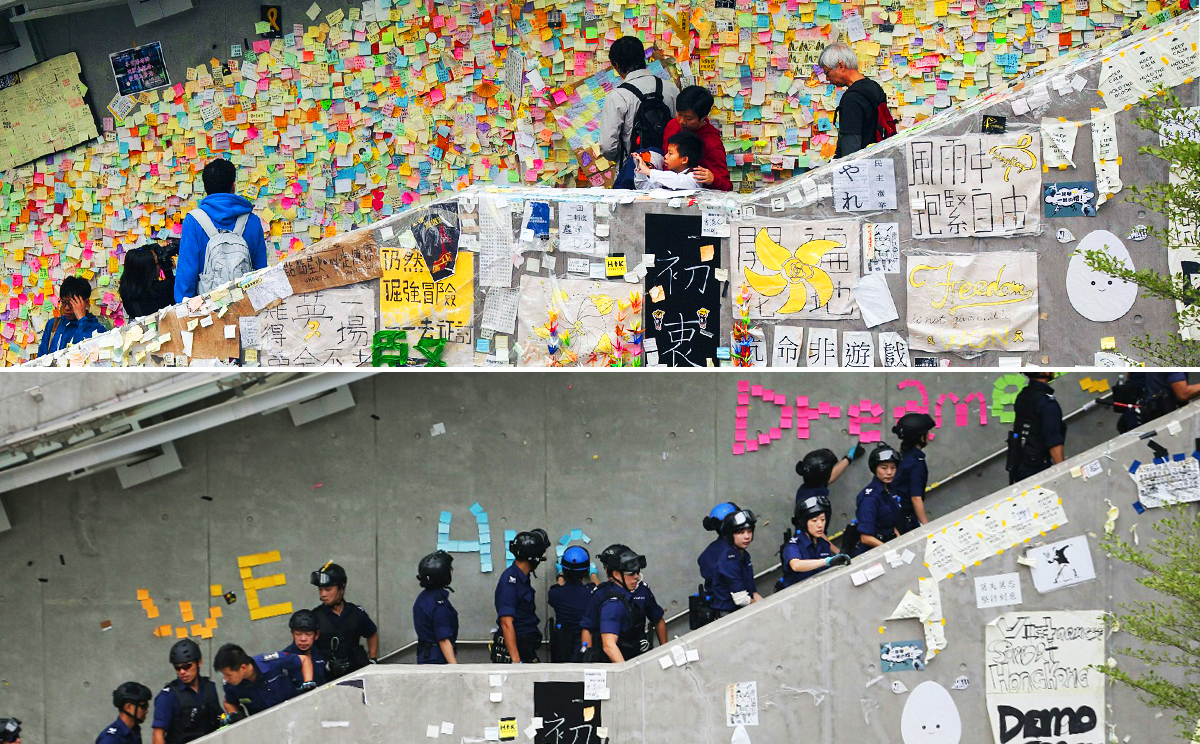-
IP addresses are NOT logged in this forum so there's no point asking. Please note that this forum is full of homophobes, racists, lunatics, schizophrenics & absolute nut jobs with a smattering of geniuses, Chinese chauvinists, Moderate Muslims and last but not least a couple of "know-it-alls" constantly sprouting their dubious wisdom. If you believe that content generated by unsavory characters might cause you offense PLEASE LEAVE NOW! Sammyboy Admin and Staff are not responsible for your hurt feelings should you choose to read any of the content here. The OTHER forum is HERE so please stop asking.
You are using an out of date browser. It may not display this or other websites correctly.
You should upgrade or use an alternative browser.
You should upgrade or use an alternative browser.
#OccupyCentral thread: Give me Liberty or Give me Death!
- Thread starter Asterix
- Start date
PUBLISHED : Friday, 12 December, 2014, 6:28am
UPDATED : Friday, 12 December, 2014, 6:28am
Let's give innocent Hong Kong shop owners a break after Occupy protests

Alex Lo
[email protected]
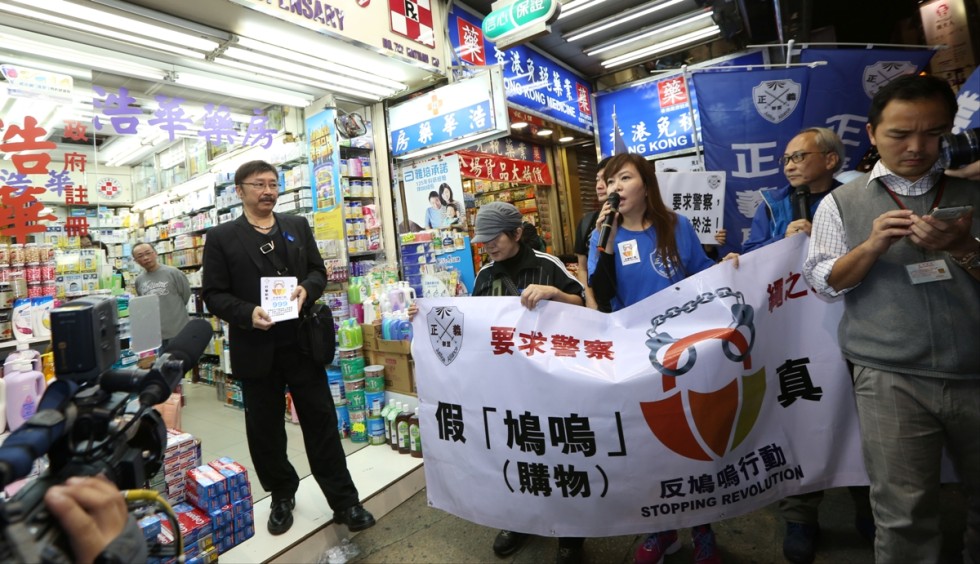
Leticia Lee See-yin (woman in blue top on the right) of the anti-occupy "Justice Alliance" and "Blue Ribbon" protests against pro-democracy activists' "shopping tour" action in Mong Kok. Photo: Nora Tam
Pity the small shops and retailers. Chief Executive Leung Chun-ying, never one known for his public relations smarts, may have misspoken when he urged people to shop in Mong Kok to make up for losses caused by the Occupy movement. Now hooligans - let's not dignify them by calling them protesters - have taken to "shopping" in the busy district.
Every night, flash mobs of dozens to hundreds of people show up at storefronts, blocking pedestrian traffic, pretending to window-shop or jamming the stores inside. If they do make purchases, it's to buy a few token inexpensive items while others walk up and down the pavements, singing and shouting slogans.
Some of them target shops whose staff might have previously complained or confronted protesters. Others go after drivers of a mini-bus company instrumental in obtaining a court injunction to evict the Mong Kok Occupy crowds.
Civil disobedience should target the right people, that is the government and its representatives. It's about winning public opinion, rather than causing disruption for disruption's sake.
But leaderless and without strategies, many Occupy activists, particularly those in Mong Kok, now think any form of non-cooperation and public disturbance is justified. Generally, those protesters in Admiralty are far more civilised, switched-on and articulate about their purpose.
They are more closely associated with the student leaders of Scholarism and the Federation of Students. The way in which they took one peaceful last stand with dignity in Admiralty yesterday before police moved in shows that theirs could remain a genuine civil disobedience movement. They must remember their battle is, first and last, to win public opinion. Blaming the government for the more extreme or violent elements of the movement can only go so far. Eventually, the movement will have to take responsibility for the hooligans among them.
Pro-democracy activists say they need new post-Occupy strategies to continue their protests, but victimising innocent shop owners and operators is no way to win public sympathy. Small businesses have suffered enough in the past two months. Let's give them a break.
Let's now find a way forward on Hong Kong's political reform
PUBLISHED : Friday, 12 December, 2014, 6:28am
UPDATED : Friday, 12 December, 2014, 8:31am
SCMP Editorial
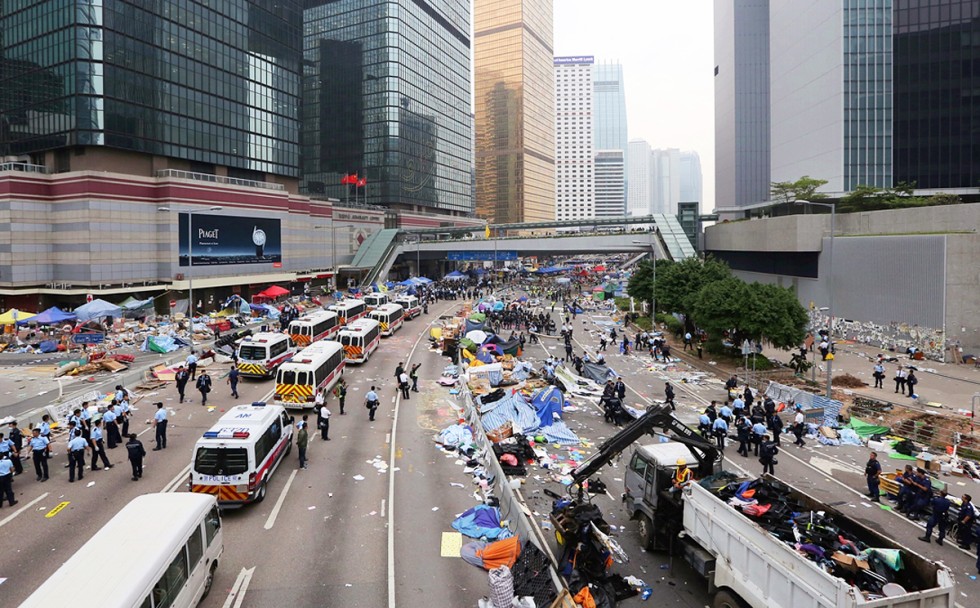
Police removed barricades and tore down tents at the Occupy protest site in Admiralty. Photo: Felix Wong
The clearance of Occupy Central was proving a long work in progress last night. Hopefully Hong Kong island's main artery may soon be flowing freely again. But it would be naive to think this would be the end of an extraordinary chapter in our history, or of the social turmoil Occupy unleashed. There are serious issues to be addressed, beginning with political reform. It was good to hear Chief Secretary Carrie Lam Yuet-ngor acknowledge as much, before the bailiffs and the police moved in yesterday. The government must be seen to engage more inclusively with all sectors of society on a range of grievances, or protesters may make good a threat to reoccupy.
No matter how admirable their political aspirations, or how many people sympathise, the way the protesters went about trying to advance them was wrong, and unlawful. Moreover, they will not be met because they fall outside a legal framework under the political reform package approved by Beijing.
However, their grievances embrace widespread dissatisfaction with Hong Kong's governance that goes beyond its current chief executive or political reform. They include economic policies, unaffordable housing, failed education reforms, lack of social mobility for young people, a widening income gap and perceived collusion between officials and property tycoons. In terms of social cohesion, that is a perfect storm of discontent. Many of these problems are now deep-rooted, and not easily solved with measures by the government of the day alone. We need to find better ways to work together as a community.
Political reform, the flashpoint for the protest, has to be the starting point. There is a need to shift the focus back on to how to work out pragmatic proposals within the legal framework that have the best chance of acceptance by lawmakers.
Hong Kong wears scars from Occupy Central that will not heal overnight. The movement has polarised society from families upwards and done nothing for the city's relationship with the mainland. Regrettably the wounds also include damage to Hong Kong's reputation and the rule of law, for which the whole community ultimately pays the price.
Yet there is room to end on a positive note prompted by the city's renown for bouncing back stronger from adversity. If there is something good to come out of this confrontation, it is a sharpened focus and new urgency to engage the whole community in finding a way forward on political reform, and more effective ways to deal with long-standing issues.
Wherever they stand on politics, Hong Kong commuters unite in relief as traffic resumes
PUBLISHED : Friday, 12 December, 2014, 7:27am
UPDATED : Friday, 12 December, 2014, 5:38pm
Eddie Lee and Alan Yu
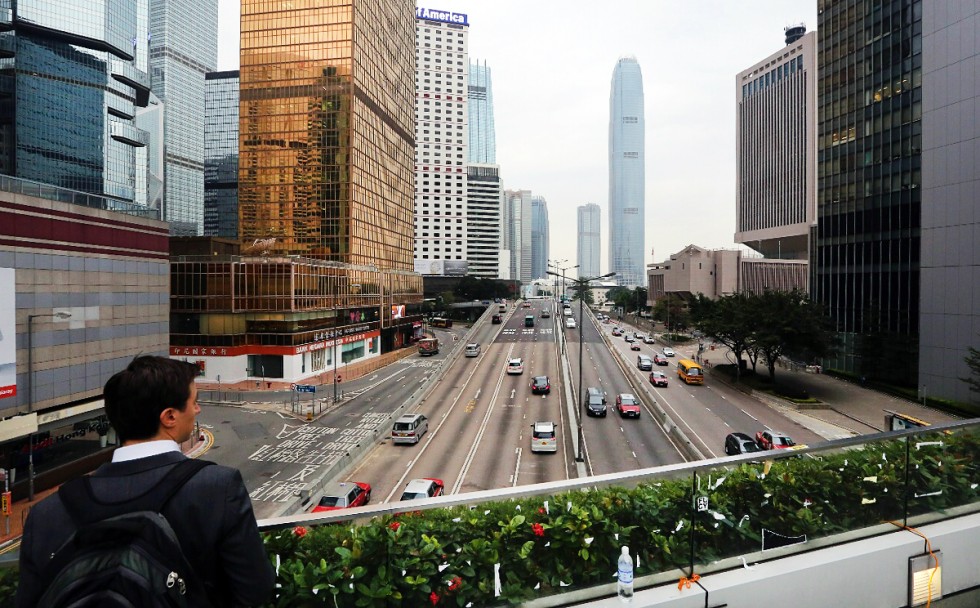
Traffic resumes on Friday December 12 on a main road in Admiralty. Photo: Felix Wong
Despite continued bus and tram service disruptions due to the remaining Causeway Bay protest site, many frustrated Hong Kong commuters expressed relief and delight on Friday morning after main roads in Admiralty reopened to traffic following Thursday's massive clearance operation.
Chan Wai-hoi, who is over 50 and repairs houses for a living, said he was very happy he no longer had to trudge up the hill to his work site in the Mid-Levels. "It's not just me; a lot of people saw their lives disrupted," he said.
Many bus lines have resumed normal service, but two serving the Hong Kong Island remain suspended, and dozens of routes continue to be diverted because key road sections in Causeway Bay are still occupied by pro-democracy protesters.
Chan said he strongly disagreed with the Occupy protesters, particularly lawmakers such as Martin Lee Chu-Ming, founding member of the Democratic Party and former party chairman Albert Ho Chun-yan.
"Back when the British ruled Hong Kong, did they ever protest on the streets? ... They're just turning against their fellow Chinese countrymen," said Chan.
New World First Bus and Citybus said H1 and H2 were still suspended owing to the closure of major roads.
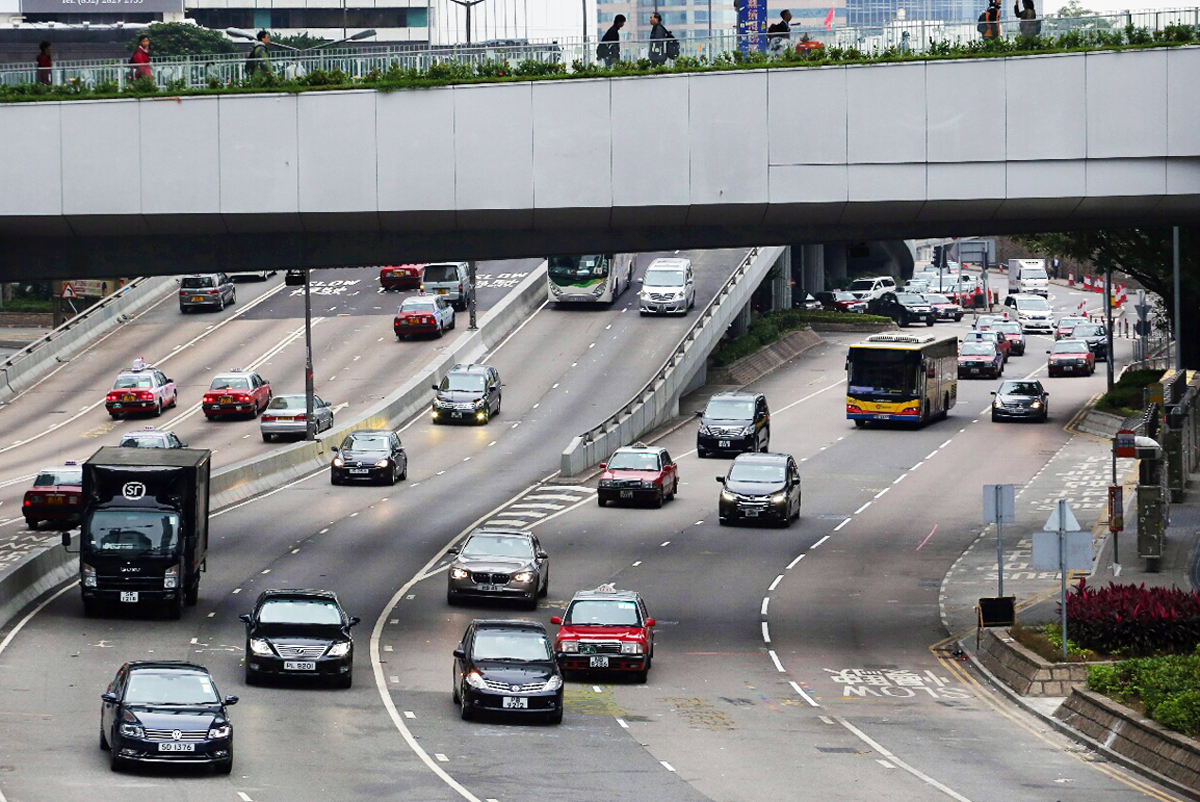
Traffic resumes on Friday December 12 on a main road in Admiralty. Photo: Felix Wong
Scores of cross-harbour routes operated by Kowloon Motor Bus are also remain diverted.
Because of the continued blockage of tram tracks in Causeway Bay, tram service between Percival Street and Paterson Street remains suspended.
The former protest zone in Admiralty is mostly clear on Friday morning. The only remainder of 75 days of protests, debates and clashes are some fragments of posters on the external walls of Admiralty Centre and the footbridge across Connaught Road and Harcourt Road.
Some chalked slogans remain visible on Connaught Road Central, reading "I want true universal suffrage" and "We'll be back."
Lam Ying, an officer worker in his 30s, said he was glad the occupation was over even though he agreed with the pursuit of democracy.
"I really hope Hong Kong can achieve democracy with true universal suffrage, but we need to calm down," he said. "We should use our votes to elect representatives to fight the fight for us. It's important that protesters only use legal means."
One protest camp remains standing at the front entrance to the Legislative Council. Around 30 tents are inside the sheltered area, including the officially designated demonstration zone. Opposite them in an outdoor plaza are around 20 more.
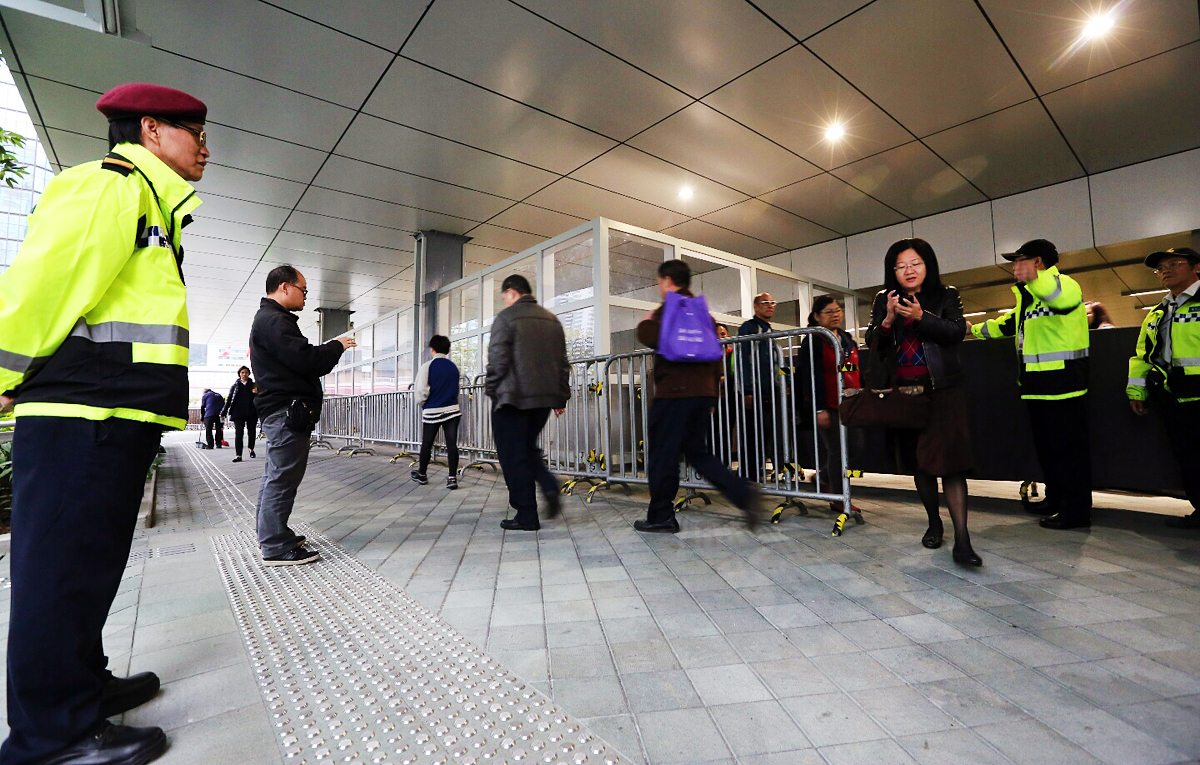
Office workers walk near Admiralty under the watch of security guards. Photo: Felix Wong
On Friday morning, police officers were seen patrolling the area, and standing guard at various locations including the footbridge connecting Citic Tower and Government Headquarters, Tamar Park and the entrance to the Chief Executive's Office on Lung Wo Road. That entrance is still protected by steel barriers.
Juan Cueval, a 30-year-old architect from Spain, said he believed leaving the protest site was a smart move for the protesters.
The occupation had also caused him trouble in the last few months when he had to walk across Tamar Park to work. Police officers would stop him for lengthy questioning because they took him to be a protester, he said.
"I had to use my business card to prove that I work here, otherwise they wouldn't even let me walk through the park."
Cueval said the Occupy Central movement reminded him of Occupy protests in Madrid a few years ago. Just like the Spanish protesters who went on to became a potent political force by forming the Podemos party and winning seats in the European Parliament, Cueval said Hong Kong protesters could still keep the movement going and achieve their goals later.
The Transport Department has said road sections including Harcourt Road, Connaught Road Central eastbound between Edinburgh Place (western portion) and Harcourt Road, and Connaught Road Central westbound between Jackson Road and Harcourt Road, have been reopened to all traffic.
But Hennessy Road eastbound between Percival Street and Jardine's Bazaar, and Yee Wo Street eastbound between East Point Road and Sugar Street remain closed.
'Small fixes' not enough to solve Hong Kong's big problems, says Beijing adviser
Leading adviser to Beijing says 'comprehensive treatment' needed to cure Hong Kong's ills - but protest leaders say more action is likely
PUBLISHED : Friday, 12 December, 2014, 12:08pm
UPDATED : Saturday, 13 December, 2014, 7:03am
Cheung Chi-fai, Fanny W. Y. Fung. Emily Tsang and Tony Cheung
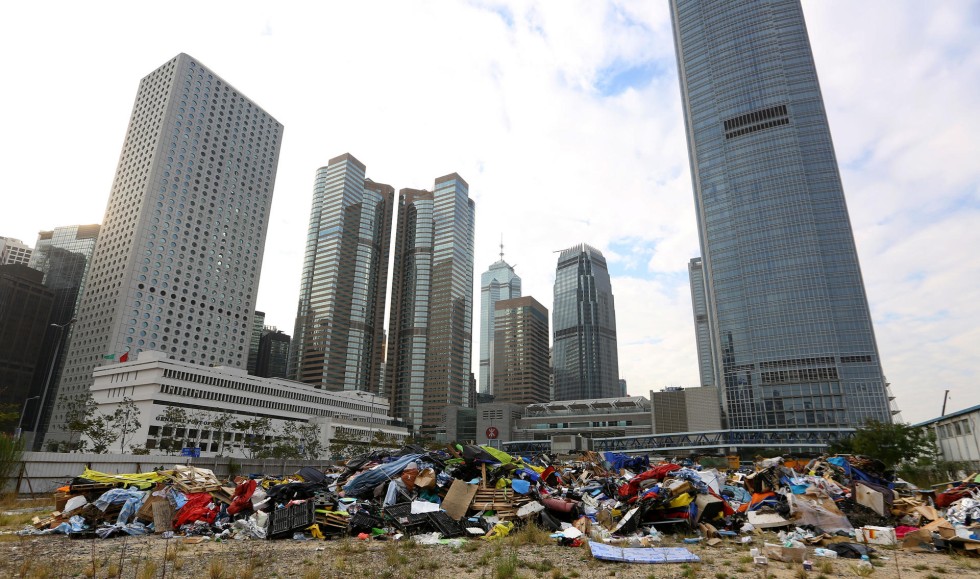
Tents, barricades and supplies from the Admiralty Occupy site lie dumped in a plot of land on the Central harbourfront yesterday, a day after the clearance. Photo: Edmond So
A top adviser to Beijing on Hong Kong affairs yesterday said the city's problems needed "a comprehensive treatment" rather than "small fixes and patches" after the main Occupy Central camp in Admiralty was cleared.
And Chen Zuoer , who heads a high-level think tank created last year to study the city's development, said supplies for the protest camps "worth at least HK$200 to HK$300 million" came from an American organisation "hidden" in a local university. Government figures have long said "external forces" were supporting Occupy, a claim protest leaders vehemently deny.
Chen, a former deputy director of the State Council's Hong Kong and Macau Affairs Office and now chairman of the Chinese Association of Hong Kong and Macau Studies, is the highest profile mainland figure to speak out since the clearance. His remarks, 24 hours after the clearance, came as protesters warned of more actions, which could grow increasingly radical if the desire for equal and universal suffrage was not met.
"All the parties including the opposing party, the 'love the country, love Hong Kong' forces, and all sectors of society have shown their muscle [over Occupy]." This was "a good thing, as it is good for a big treatment to correct the chaos and restore peace. It is not a small fix and patch."
A spokesman for the Hong Kong and Macau Affairs Office meanwhile called for "rational and pragmatic" discussion of the city's political future.
"We hope that Hong Kong's society will … build consensus about its political development within the boundaries of the Basic Law and decisions adopted by the Standing Committee of the National People's Congress," he said. Beijing's framework for the 2017 chief executive election - under which a 1,200-strong committee would pick two or three candidates for the public to choose from - should be followed, the spokesman added.
But leading pro-democracy figures said more protests were likely as the government rolled out a second round of consultation on reform and the reform package was put to the Legislative Council, where pan-democrats have threatened to veto it.
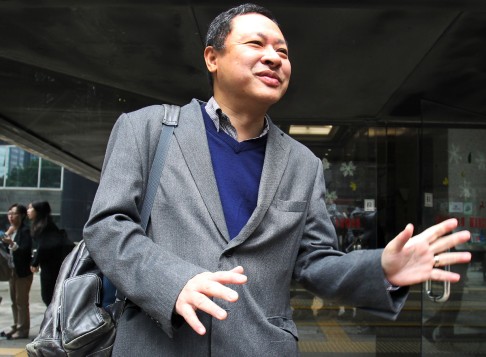
Occupy Central co-founder Benny Tai says the end of the encampments did not mean the end of the protests. Photo: May Tse
Benny Tai Yiu-ting, a co-founder of Occupy Central, said the end of the encampments did not mean the end of the protests.
"Even if Legco vetoes the government's reform it doesn't solve the problem, and Hong Kong's governance might only worsen," Tai said.
Joshua Wong Chi-fung, convenor of student group Scholarism, said more protests could be held around the government's consultation. But tactics would change in an attempt to win over people keen on democracy but frustrated by street blockades.
Acknowledging that public support had waned, Wong said: "If there are … civil disobedience campaigns in the future, we won't drag them on but will use flexible strategies."
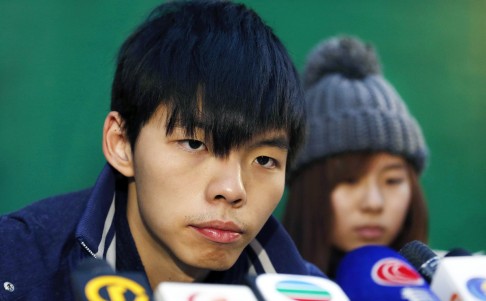
Student leader Joshua Wong says more protests could be held around the government's consultation. Photo: Reuters
Meanwhile a large pile of broken tents and other rubbish from Admiralty was yesterday seen dumped in a plot on the Central harbourfront. The Food and Environmental Hygiene Department confirmed the detritus was left there on police instructions. Police did not respond to requests for comment last night.
Additional reporting by Jennifer Ngo
Re: Hong Kong Students indefinite hunger strike secrets revealed
PUBLISHED : Friday, 12 December, 2014, 2:49pm
UPDATED : Friday, 12 December, 2014, 7:59pm
Despite end of Occupy protests, civil disobedience will live on in Hong Kong
Michael Chugani says the end of Occupy has not doused the spirit of civil disobedience in Hong Kong, where the stage is now set for further action

Michael Chugani
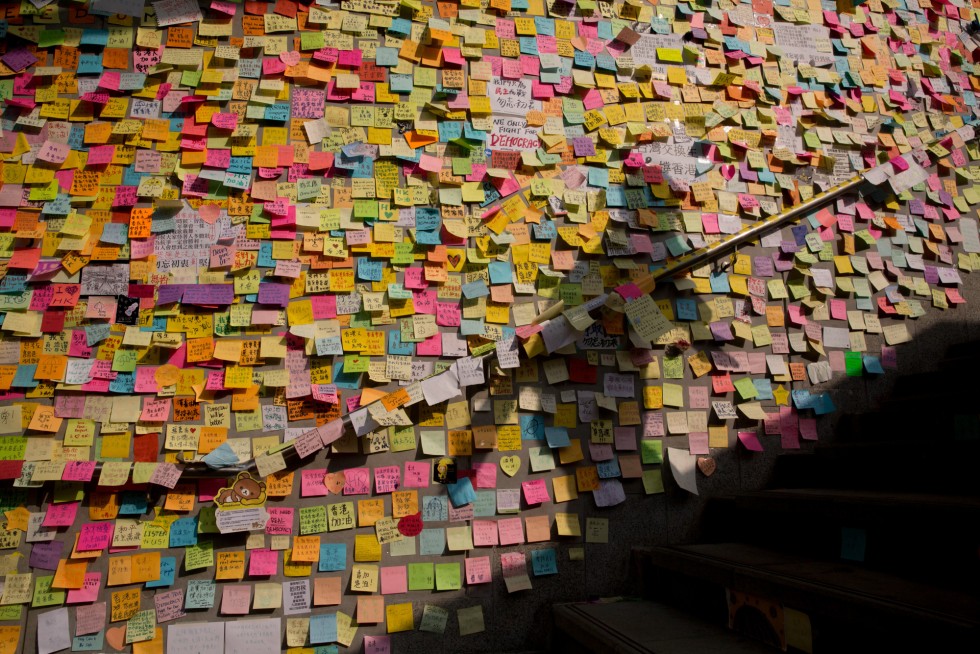
Occupy protesters' parting message was that they'll be back. Photo: Bloomberg
Who won and who lost? That is not a question a community should feel the need to ask itself. If it necessitates asking, then we have all lost. There are no winners in a community at war with itself. Hong Kong has been at war with itself for over 75 days now. Occupy Central's emotional end two days ago will no doubt tempt opposing sides to claim moral victory.
Proponents will hail Occupy as a civil disobedience movement that awakened beyond all expectations awareness among Hong Kong's politically apathetic younger generation. This will breathe new life into the greying democracy movement. Opponents will mock Occupy as an ill-conceived mission that not only failed but radicalised the young, fuelling further mistrust between Hong Kong and Beijing.
The truth lies somewhere in between. More than two months of civil disobedience has brought us no closer to so-called genuine democracy. In fact, it can be argued that Occupy had pushed us even further away from the goal. But it can equally be argued that its demise does not mean the flames that fed it have been extinguished. Civil disobedience is here to stay. The scary thing is that we don't know how it will mutate - peacefully or violently.
It leaves us in politically uncharted terrain. What we saw over the past 75 days has already numbed our senses. Who could even have imagined that our democracy fight would one day produce shocking images of Hongkongers with hard hats, goggles and spiked makeshift shields confronting baton-wielding policemen like two clashing armies? Yet we saw not only that but police tear-gassing protesters, beating up one in a dark corner, protesters kicking a policeman unconscious and radicals smashing the doors of the Legislative Council building.
We used to be appalled by radical legislators hurling bananas at officials in Legco. Thinking back, we can now say that was our age of political innocence. We lost that innocence on September 28. Much as we would like to tell ourselves Occupy was a movement with love and peace, those of us who dare face our conscience know that was not entirely true. There was nothing innocent about the call for protesters to storm government headquarters. I don't know what provoked the police to fire tear gas but something inside me tells me they wouldn't have done so if the protest crowds that day had been wholly innocent.
Occupy thankfully ended without the violence that marked the clearance in Mong Kok. But the realists among us know Occupy was only Act One. What will Act Two be like? I don't dare guess. Occupy architect Benny Tai Yiu-ting wrote in
The New York Times that unless Beijing bows to the demands of the Umbrella Generation - which we know it won't - what awaits us will be fiercer.
What could be fiercer in the Hong Kong context than spiked shields, bricks and metal barriers used as weapons? Burning cars and petrol bombs? It's too painful even to imagine. Occupy protesters' parting message was that they'll be back. Let's not even think about what awaits us.
Michael Chugani is a columnist and TV show host. [email protected]
PUBLISHED : Friday, 12 December, 2014, 2:49pm
UPDATED : Friday, 12 December, 2014, 7:59pm
Despite end of Occupy protests, civil disobedience will live on in Hong Kong
Michael Chugani says the end of Occupy has not doused the spirit of civil disobedience in Hong Kong, where the stage is now set for further action

Michael Chugani

Occupy protesters' parting message was that they'll be back. Photo: Bloomberg
Who won and who lost? That is not a question a community should feel the need to ask itself. If it necessitates asking, then we have all lost. There are no winners in a community at war with itself. Hong Kong has been at war with itself for over 75 days now. Occupy Central's emotional end two days ago will no doubt tempt opposing sides to claim moral victory.
Proponents will hail Occupy as a civil disobedience movement that awakened beyond all expectations awareness among Hong Kong's politically apathetic younger generation. This will breathe new life into the greying democracy movement. Opponents will mock Occupy as an ill-conceived mission that not only failed but radicalised the young, fuelling further mistrust between Hong Kong and Beijing.
The truth lies somewhere in between. More than two months of civil disobedience has brought us no closer to so-called genuine democracy. In fact, it can be argued that Occupy had pushed us even further away from the goal. But it can equally be argued that its demise does not mean the flames that fed it have been extinguished. Civil disobedience is here to stay. The scary thing is that we don't know how it will mutate - peacefully or violently.
It leaves us in politically uncharted terrain. What we saw over the past 75 days has already numbed our senses. Who could even have imagined that our democracy fight would one day produce shocking images of Hongkongers with hard hats, goggles and spiked makeshift shields confronting baton-wielding policemen like two clashing armies? Yet we saw not only that but police tear-gassing protesters, beating up one in a dark corner, protesters kicking a policeman unconscious and radicals smashing the doors of the Legislative Council building.
We used to be appalled by radical legislators hurling bananas at officials in Legco. Thinking back, we can now say that was our age of political innocence. We lost that innocence on September 28. Much as we would like to tell ourselves Occupy was a movement with love and peace, those of us who dare face our conscience know that was not entirely true. There was nothing innocent about the call for protesters to storm government headquarters. I don't know what provoked the police to fire tear gas but something inside me tells me they wouldn't have done so if the protest crowds that day had been wholly innocent.
Occupy thankfully ended without the violence that marked the clearance in Mong Kok. But the realists among us know Occupy was only Act One. What will Act Two be like? I don't dare guess. Occupy architect Benny Tai Yiu-ting wrote in
The New York Times that unless Beijing bows to the demands of the Umbrella Generation - which we know it won't - what awaits us will be fiercer.
What could be fiercer in the Hong Kong context than spiked shields, bricks and metal barriers used as weapons? Burning cars and petrol bombs? It's too painful even to imagine. Occupy protesters' parting message was that they'll be back. Let's not even think about what awaits us.
Michael Chugani is a columnist and TV show host. [email protected]
Re: Hong Kong Students indefinite hunger strike secrets revealed
James Tien sends conciliatory message in dialogue with student leaders
PUBLISHED : Friday, 12 December, 2014, 1:08pm
UPDATED : Friday, 12 December, 2014, 6:06pm
Jennifer Ngo
[email protected]
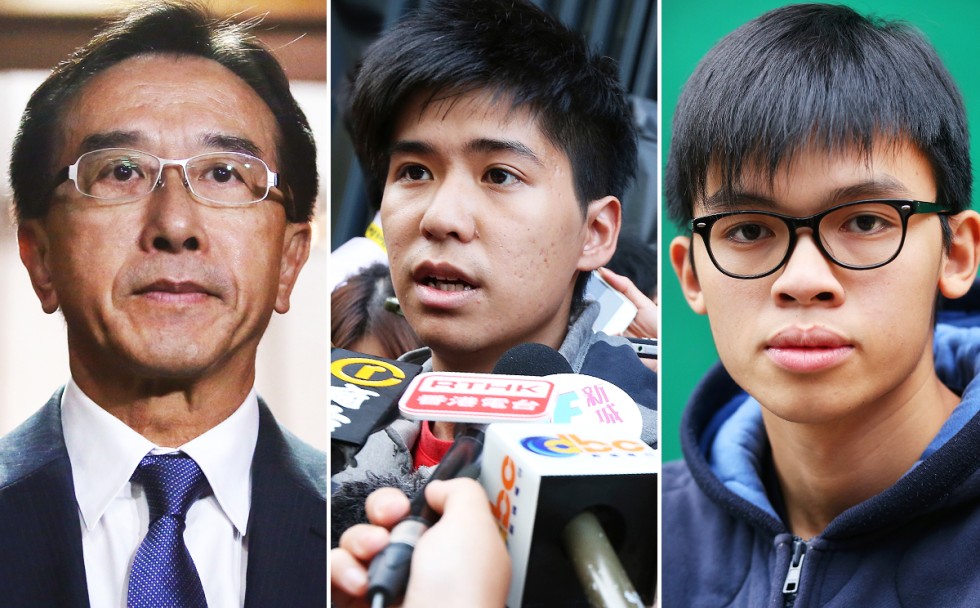
James Tien (from left) talks with student leaders including Scholarism's Lester Shum and Oscar Lai Man-lok in a radio dialogue. Photos: Sam Tsang, David Wong, K.Y. Cheng
Lawmaker James Tien Pei-chun said he had no qualms about passing Hong Kong to the next generation, in a radio dialogue with student leaders including Scholarism's Oscar Lai Man-lok and Lester Shum of the Hong Kong Federation of Students.
"I have confidence in my own children and grandchildren…and from [the students'] perspective, what they are saying and their rationale makes sense," said Tien, a moderate pro-establishment lawmaker who in late October suffered the setback of being removed from the CPPCC, the national political consultation body, after he called on Chief Executive CY Leung to resign. Tien has also resigned as chairman of the Liberal Party.
However, Tien admitted that there is a wide gulf between the older and the newer generations in Hong Kong. He also cautioned that it is important for students to keep in mind Hong Kong's political structure under "one country two systems" - especially the "one country" part.
"Yes there probably is a generational gap. Our definitions of universal suffrage differ - whether one person one vote equates genuine universal suffrage is debatable," said Lai from Scholarism. But Lai said the Occupy Movement was a multi-generational one, with people from all walks of life joining in.
Shum from HKFS said it was important that society recognise that Hong Kong is no longer a transient and refugee community, but a permanent home for many.
"Having a home meant having choices and rights in the place," he added. "We agree that it's one country two systems, and understand that the sovereignty is with the Chinese central government, but governance is with Hong Kong. This includes electing our own city's leader."
Shum said it was tough for him not being able to sit with his comrades in the frontline yesterday, referring to the clearance of the main Occupy protest zone in Admiralty and the arrest of more than 200 protest leaders, pan-democratic politicians and activists.
"We have not lost, the government did not win," he said, noting that the students are discussing their next steps of action, and called for an open public dialogue with the government.
The students stated that they would adhere to the principles of peace and non-violence in all future actions. But Shum admitted that, as there are many different people with different ideas among the protesters, there may be different levels of armed resistance or violent acts taken by others.
Tien also called for dialogues between students and government to solve the political standoff, as he said he believed the civil disobedience actions had just started. The government should also meet with people from different sectors to understand their thoughts on constitutional reform, he said.
However, Tien said his party was more in favour of accepting the current proposal first - "pocketing it for now" - so that constitutional reform can move forward.
James Tien sends conciliatory message in dialogue with student leaders
PUBLISHED : Friday, 12 December, 2014, 1:08pm
UPDATED : Friday, 12 December, 2014, 6:06pm
Jennifer Ngo
[email protected]

James Tien (from left) talks with student leaders including Scholarism's Lester Shum and Oscar Lai Man-lok in a radio dialogue. Photos: Sam Tsang, David Wong, K.Y. Cheng
Lawmaker James Tien Pei-chun said he had no qualms about passing Hong Kong to the next generation, in a radio dialogue with student leaders including Scholarism's Oscar Lai Man-lok and Lester Shum of the Hong Kong Federation of Students.
"I have confidence in my own children and grandchildren…and from [the students'] perspective, what they are saying and their rationale makes sense," said Tien, a moderate pro-establishment lawmaker who in late October suffered the setback of being removed from the CPPCC, the national political consultation body, after he called on Chief Executive CY Leung to resign. Tien has also resigned as chairman of the Liberal Party.
However, Tien admitted that there is a wide gulf between the older and the newer generations in Hong Kong. He also cautioned that it is important for students to keep in mind Hong Kong's political structure under "one country two systems" - especially the "one country" part.
"Yes there probably is a generational gap. Our definitions of universal suffrage differ - whether one person one vote equates genuine universal suffrage is debatable," said Lai from Scholarism. But Lai said the Occupy Movement was a multi-generational one, with people from all walks of life joining in.
Shum from HKFS said it was important that society recognise that Hong Kong is no longer a transient and refugee community, but a permanent home for many.
"Having a home meant having choices and rights in the place," he added. "We agree that it's one country two systems, and understand that the sovereignty is with the Chinese central government, but governance is with Hong Kong. This includes electing our own city's leader."
Shum said it was tough for him not being able to sit with his comrades in the frontline yesterday, referring to the clearance of the main Occupy protest zone in Admiralty and the arrest of more than 200 protest leaders, pan-democratic politicians and activists.
"We have not lost, the government did not win," he said, noting that the students are discussing their next steps of action, and called for an open public dialogue with the government.
The students stated that they would adhere to the principles of peace and non-violence in all future actions. But Shum admitted that, as there are many different people with different ideas among the protesters, there may be different levels of armed resistance or violent acts taken by others.
Tien also called for dialogues between students and government to solve the political standoff, as he said he believed the civil disobedience actions had just started. The government should also meet with people from different sectors to understand their thoughts on constitutional reform, he said.
However, Tien said his party was more in favour of accepting the current proposal first - "pocketing it for now" - so that constitutional reform can move forward.
Re: Hong Kong Students indefinite hunger strike secrets revealed
The source of Hong Kong youth’s frustration
Siegfried Sin says young people are, above all, angry at the uncompromising attitudes of the older generation, and the fact they have had no voice in society – until now
PUBLISHED : Friday, 12 December, 2014, 3:50pm
UPDATED : Saturday, 13 December, 2014, 11:47am
Siegfried Sin
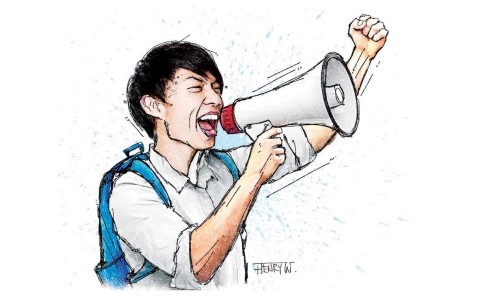
Hong Kong's youth yearns to be heard, and feel valued.
Over the past two months, Hong Kong has witnessed the biggest social movement in its history. Signs showing illustrations of umbrellas, the active participation of youth, and widespread conflict in society have characterised the umbrella movement.
Yet why, exactly, have Hong Kong’s youth stepped up? Why are we angry? What can we do next?
The question of “Why us?” has been a basic focus. We have witnessed student leaders taking a planning and execution role, with some making headlines in local and international media; thousands of other students, some still in uniform, have quietly cleaned the streets, studied in temporary self-study corners or organised different activities for the movement. As a result, it has been easy to ask whether they are under any kind of influence. Some people have talked of “foreign influence”.
I can say that there is influence – from what are known as “universal values”. We were taught well in childhood: we have embraced liberty, equality and fraternity from our history lessons; we understand the importance of the law, free speech and press and internet freedoms; and believe in hard work and reason, not tricks or crony capitalism. Such values are hardly “foreign”; although they may have been discovered outside Hong Kong, they are not hard to find, given the right time and situation. The exact meaning of these values may change, but their nature stays the same, and is applicable around the world.
With such values in mind, we feel frustrated and angry about the future of Hong Kong. Politically, we are offered a “fake democracy”, with Beijing giving the final “blessing” on chief executive candidates, and a crippled Legislative Council. Socially, welfare is minimal, and housing is starting to become an impossible dream for young people. Economically, the “Pearl of the Orient”, once a city of energy and prosperity, now clings onto finance and trade with mainland China.
We see no future in this city – a city that we love. Hong Kong should never be mediocre. And so we are speaking up now, to prevent that from happening.
Most of our frustration and anger comes from the uncompromising older generation. With a huge discrepancy in values and worldviews, they are the source of – in our eyes – “unreasonable comments”, to put it mildly. In their eyes, young people have a low value. According to some prominent figures, we are “unrealistic and inconsiderate”, and “only see what we need”. We were told to return to our schools and books, and to seek more opportunities worldwide, instead of putting our narrow focus on this city.
One former education secretary questioned our resolve in pursuing our democratic goals, asking us to quit university to show determination, while another official claimed people are leaving the city because they are afraid of our youth.
Among all the comments, there are two central themes: young people are not supposed to talk but study; and, by not doing so, we are naughty, and need to be punished. From the very start, our voices have been deliberately disregarded.
There is nowhere for us to voice our opinions: lawmakers are mostly over 40, and then there are the more “senior” Executive Council members and top officials. The Commission on Youth, designed to deal with “youth matters”, has a chairman who is 55.
Not only are all these people old, they are unwilling to represent youth. There is no youth council in the city that represents our voice. Youth affairs are decided by government officials, who are a long way from their own youth, never mind us. Apart from the usual consultation exercises, which are rare on youth matters, we have very little say on the policies that affect us: from our education system and welfare, to youth developments, we are customers who are not allowed to give feedback.
Hong Kong’s youth yearns to be heard, and feel valued. If we cannot be heard properly, inevitably, we will resort to other unconventional means to express our opinions.
Post-Occupy, the young protesters face a crucial question: “What next?” Hong Kong’s youth must use their knowledge and energy to educate the public, participate at every opportunity in policymaking and consultation, and reconcile with society.
Educating the public, who are unaware of, or have misunderstood the political reform agenda, is vital. Many in society still distance themselves from any political issue, and some are ignorant about the entire subject. Moreover, some essential features of a free society, such as the rule of law, have been distorted throughout the movement. Bringing people first-hand information using simple language would enable them to form an opinion, even if it is different from ours – a genuine democracy never rules out the minority, but does respect it.
Participation in policymaking will allow our voices to be heard. In the past, we were silent on many occasions when the government asked for opinions: we either had no desire to speak out, or were completely unaware of the consultations.
However, with the use of technology and the internet, such information is now readily available, and so we voice our concerns. From a comment, or a post on social media, to actually being part of the policymaking process, we can no longer be silent about the future of this city.
We need to make peace with society, as it has been torn apart during the movement. The distrust between the government and the people has extended to the police. Many friends and families have had fierce debates about the movement. Relationships have been badly damaged. Hong Kong cannot afford such social divisions to remain.
Although we are no longer “a barren rock with nary a house upon it”, we are still far from world class. We need to work together to make this city great. So we need to lower our hostility, and listen to what the opposite side is saying. Understanding each other is step one; making peace is step two.
We should hold on to the truth of the events in the movement, and move on: those who erred must be corrected, either through punishment or their own realisation; records must reflect the true story of the movement. Only when we accept the truth and hold on to it can society move on.
Siegfried Sin is a law student at the Chinese University of Hong Kong and a member of the CUHK Law Student Political Reform Concern Group
The source of Hong Kong youth’s frustration
Siegfried Sin says young people are, above all, angry at the uncompromising attitudes of the older generation, and the fact they have had no voice in society – until now
PUBLISHED : Friday, 12 December, 2014, 3:50pm
UPDATED : Saturday, 13 December, 2014, 11:47am
Siegfried Sin

Hong Kong's youth yearns to be heard, and feel valued.
Over the past two months, Hong Kong has witnessed the biggest social movement in its history. Signs showing illustrations of umbrellas, the active participation of youth, and widespread conflict in society have characterised the umbrella movement.
Yet why, exactly, have Hong Kong’s youth stepped up? Why are we angry? What can we do next?
The question of “Why us?” has been a basic focus. We have witnessed student leaders taking a planning and execution role, with some making headlines in local and international media; thousands of other students, some still in uniform, have quietly cleaned the streets, studied in temporary self-study corners or organised different activities for the movement. As a result, it has been easy to ask whether they are under any kind of influence. Some people have talked of “foreign influence”.
I can say that there is influence – from what are known as “universal values”. We were taught well in childhood: we have embraced liberty, equality and fraternity from our history lessons; we understand the importance of the law, free speech and press and internet freedoms; and believe in hard work and reason, not tricks or crony capitalism. Such values are hardly “foreign”; although they may have been discovered outside Hong Kong, they are not hard to find, given the right time and situation. The exact meaning of these values may change, but their nature stays the same, and is applicable around the world.
With such values in mind, we feel frustrated and angry about the future of Hong Kong. Politically, we are offered a “fake democracy”, with Beijing giving the final “blessing” on chief executive candidates, and a crippled Legislative Council. Socially, welfare is minimal, and housing is starting to become an impossible dream for young people. Economically, the “Pearl of the Orient”, once a city of energy and prosperity, now clings onto finance and trade with mainland China.
We see no future in this city – a city that we love. Hong Kong should never be mediocre. And so we are speaking up now, to prevent that from happening.
Most of our frustration and anger comes from the uncompromising older generation. With a huge discrepancy in values and worldviews, they are the source of – in our eyes – “unreasonable comments”, to put it mildly. In their eyes, young people have a low value. According to some prominent figures, we are “unrealistic and inconsiderate”, and “only see what we need”. We were told to return to our schools and books, and to seek more opportunities worldwide, instead of putting our narrow focus on this city.
One former education secretary questioned our resolve in pursuing our democratic goals, asking us to quit university to show determination, while another official claimed people are leaving the city because they are afraid of our youth.
Among all the comments, there are two central themes: young people are not supposed to talk but study; and, by not doing so, we are naughty, and need to be punished. From the very start, our voices have been deliberately disregarded.
There is nowhere for us to voice our opinions: lawmakers are mostly over 40, and then there are the more “senior” Executive Council members and top officials. The Commission on Youth, designed to deal with “youth matters”, has a chairman who is 55.
Not only are all these people old, they are unwilling to represent youth. There is no youth council in the city that represents our voice. Youth affairs are decided by government officials, who are a long way from their own youth, never mind us. Apart from the usual consultation exercises, which are rare on youth matters, we have very little say on the policies that affect us: from our education system and welfare, to youth developments, we are customers who are not allowed to give feedback.
Hong Kong’s youth yearns to be heard, and feel valued. If we cannot be heard properly, inevitably, we will resort to other unconventional means to express our opinions.
Post-Occupy, the young protesters face a crucial question: “What next?” Hong Kong’s youth must use their knowledge and energy to educate the public, participate at every opportunity in policymaking and consultation, and reconcile with society.
Educating the public, who are unaware of, or have misunderstood the political reform agenda, is vital. Many in society still distance themselves from any political issue, and some are ignorant about the entire subject. Moreover, some essential features of a free society, such as the rule of law, have been distorted throughout the movement. Bringing people first-hand information using simple language would enable them to form an opinion, even if it is different from ours – a genuine democracy never rules out the minority, but does respect it.
Participation in policymaking will allow our voices to be heard. In the past, we were silent on many occasions when the government asked for opinions: we either had no desire to speak out, or were completely unaware of the consultations.
However, with the use of technology and the internet, such information is now readily available, and so we voice our concerns. From a comment, or a post on social media, to actually being part of the policymaking process, we can no longer be silent about the future of this city.
We need to make peace with society, as it has been torn apart during the movement. The distrust between the government and the people has extended to the police. Many friends and families have had fierce debates about the movement. Relationships have been badly damaged. Hong Kong cannot afford such social divisions to remain.
Although we are no longer “a barren rock with nary a house upon it”, we are still far from world class. We need to work together to make this city great. So we need to lower our hostility, and listen to what the opposite side is saying. Understanding each other is step one; making peace is step two.
We should hold on to the truth of the events in the movement, and move on: those who erred must be corrected, either through punishment or their own realisation; records must reflect the true story of the movement. Only when we accept the truth and hold on to it can society move on.
Siegfried Sin is a law student at the Chinese University of Hong Kong and a member of the CUHK Law Student Political Reform Concern Group
Re: Hong Kong Students indefinite hunger strike secrets revealed
Arrested Hong Kong activists released as pro-democracy protests continue
PUBLISHED : Saturday, 13 December, 2014, 1:01am
UPDATED : Saturday, 13 December, 2014, 1:51am
Jennifer Ngo and Fanny Fung
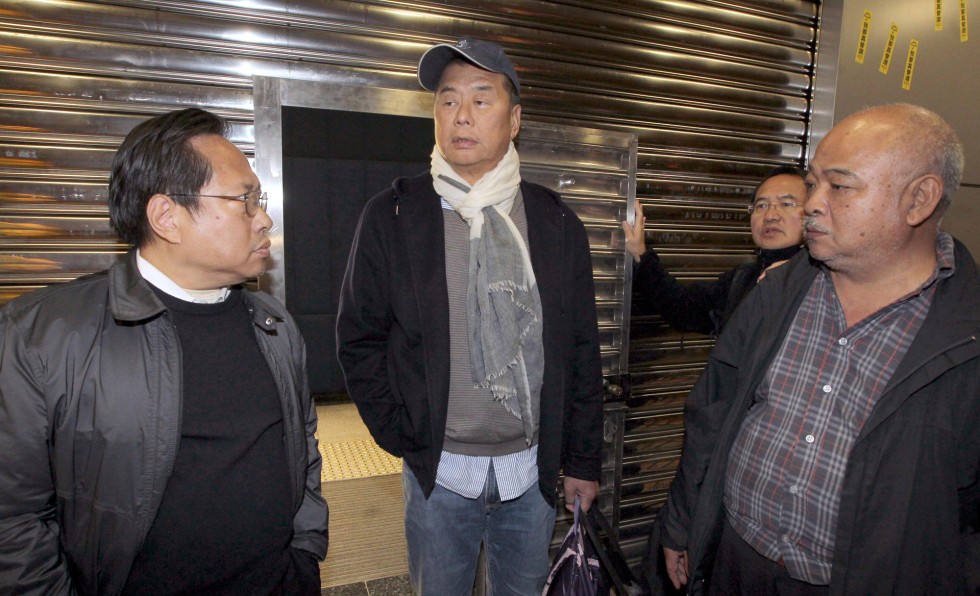
(From left) Albert Ho, Next Media's Jimmy Lai, Lee Wing-tat and Tsang Kin-sing after their release yesterday. Photo: SCMP
All protesters arrested on the last day of the Occupy camp in Admiralty were released yesterday morning, the day after the clearance, with most of them refusing bail.
But the protests continued last night, as democracy supporters staged a "shopping" trip to Causeway Bay, where a bizarre stand-off saw police raise yellow warning flags as protesters dressed in choir garb sang carols and waved banners outside Times Square.
A crowd of about 200 gathered for the impromptu concert, some raising yellow umbrellas as police raised a sign telling people to disperse. The crowd later broke up without arrests. Similar "shopping" trips, in which crowds walk slowly to disrupt commercial areas, have been held in Mong Kok since the protest camp there was dispersed.
Earlier in the day, 249 people arrested in Admiralty on charges of unlawful assembly and obstructing police were released unconditionally, according to barrister Alvin Yeung Ngok-kiu.
"I would say that the majority of them refused bail," said Yeung, a member of a team of pro-bono lawyers offering advice to people arrested during the 21/2 month democracy campaign. Among those released were media mogul Jimmy Lai Chee-ying and pop star Denise Ho Wan-sze, who both refused bail. A record 15 lawmakers were also arrested.
Suspects who refuse bail must be charged or released without conditions. Police can still prosecute them later.
Meanwhile, Scholarism convenor Joshua Wong Chi-fung responded to criticism by New People's Party chairwoman Regina Ip Lau Suk-yee, who had singled Wong out for not allowing himself to be arrested during the Admiralty clearance.
Wong, on bail after being charged with contempt of court, had said he wanted to avoid being detained until his next court hearing on January 14, but Ip asked on social media: "Why did he not stay with his comrades? ... This is against the principle of civil disobedience."
Asked to respond to Ip's criticism on RTHK yesterday, Wong said: "If I was to turn my back on my comrades, why would I go to the police station last night? It is impossible for everyone to be on the front line, leaving no one to play the coordination role."
Tommy Cheung Sau-yin of the Federation of Students added that more activists were now deployed to do backstage work, because they learned a lesson from the arrests of 511 people in the sit-in in Central on July 2.
"It wasn't very smooth [on July 2] ... We had to track where each vehicle went. This time, those arrested were even taken to different police stations," he said.
Wong and Lester Shum from the federation had expressed anguish over not being able to be arrested with their comrades, in interviews before the clearance of the Admiralty protest site.
"It was really tough not being on the front line with everyone," said Shum. He also urged supporters to continue to seek genuine democracy, adding that Hong Kong was now a permanent home, not a refugee community.
"Having a home means having choices and rights there," he said. "We agree that it's one country, two systems, but remember that sovereignty is with the central government, governance is with Hong Kong."
Additional reporting by Emily Tsang
Arrested Hong Kong activists released as pro-democracy protests continue
PUBLISHED : Saturday, 13 December, 2014, 1:01am
UPDATED : Saturday, 13 December, 2014, 1:51am
Jennifer Ngo and Fanny Fung

(From left) Albert Ho, Next Media's Jimmy Lai, Lee Wing-tat and Tsang Kin-sing after their release yesterday. Photo: SCMP
All protesters arrested on the last day of the Occupy camp in Admiralty were released yesterday morning, the day after the clearance, with most of them refusing bail.
But the protests continued last night, as democracy supporters staged a "shopping" trip to Causeway Bay, where a bizarre stand-off saw police raise yellow warning flags as protesters dressed in choir garb sang carols and waved banners outside Times Square.
A crowd of about 200 gathered for the impromptu concert, some raising yellow umbrellas as police raised a sign telling people to disperse. The crowd later broke up without arrests. Similar "shopping" trips, in which crowds walk slowly to disrupt commercial areas, have been held in Mong Kok since the protest camp there was dispersed.
Earlier in the day, 249 people arrested in Admiralty on charges of unlawful assembly and obstructing police were released unconditionally, according to barrister Alvin Yeung Ngok-kiu.
"I would say that the majority of them refused bail," said Yeung, a member of a team of pro-bono lawyers offering advice to people arrested during the 21/2 month democracy campaign. Among those released were media mogul Jimmy Lai Chee-ying and pop star Denise Ho Wan-sze, who both refused bail. A record 15 lawmakers were also arrested.
Suspects who refuse bail must be charged or released without conditions. Police can still prosecute them later.
Meanwhile, Scholarism convenor Joshua Wong Chi-fung responded to criticism by New People's Party chairwoman Regina Ip Lau Suk-yee, who had singled Wong out for not allowing himself to be arrested during the Admiralty clearance.
Wong, on bail after being charged with contempt of court, had said he wanted to avoid being detained until his next court hearing on January 14, but Ip asked on social media: "Why did he not stay with his comrades? ... This is against the principle of civil disobedience."
Asked to respond to Ip's criticism on RTHK yesterday, Wong said: "If I was to turn my back on my comrades, why would I go to the police station last night? It is impossible for everyone to be on the front line, leaving no one to play the coordination role."
Tommy Cheung Sau-yin of the Federation of Students added that more activists were now deployed to do backstage work, because they learned a lesson from the arrests of 511 people in the sit-in in Central on July 2.
"It wasn't very smooth [on July 2] ... We had to track where each vehicle went. This time, those arrested were even taken to different police stations," he said.
Wong and Lester Shum from the federation had expressed anguish over not being able to be arrested with their comrades, in interviews before the clearance of the Admiralty protest site.
"It was really tough not being on the front line with everyone," said Shum. He also urged supporters to continue to seek genuine democracy, adding that Hong Kong was now a permanent home, not a refugee community.
"Having a home means having choices and rights there," he said. "We agree that it's one country, two systems, but remember that sovereignty is with the central government, governance is with Hong Kong."
Additional reporting by Emily Tsang
Re: Hong Kong Students indefinite hunger strike secrets revealed
Just fine all of them and throw away the key, when sending them to prison that is all they are good for lazy pig.....
Just fine all of them and throw away the key, when sending them to prison that is all they are good for lazy pig.....

Re: Hong Kong Students indefinite hunger strike secrets revealed
Hong Kong police to clear final protest zone on Monday: source
PUBLISHED : Saturday, 13 December, 2014, 1:01am
UPDATED : Saturday, 13 December, 2014, 1:01am
Clifford Lo, Alan Yu and Kathy Gao
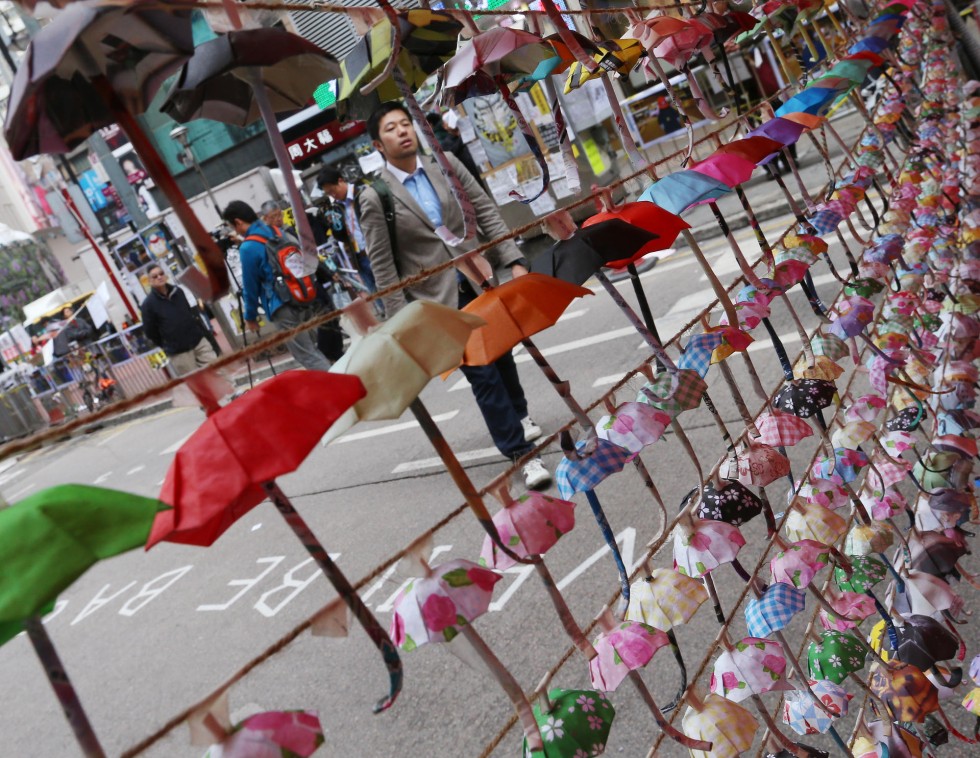
Paper umbrellas hang in Causeway Bay - for now at least. Photo: K.Y. Cheng
Hundreds of police officers will clear the final Occupy Central protest zone in Causeway Bay on Monday morning, a police source says.
The clearance would begin after 9am and those who refused to leave the site in Yee Wo Street would face arrest for unlawful assembly and for obstructing police, the source said.
"We will give warnings and enough time to illegal occupiers to collect their belongings and leave the sites before our officers move in," the source said.
Police are understood to be planning a press conference to appeal to the pro-democracy protesters to leave their site, close to the Sogo department store.
And the source said a strong police presence would remain in Causeway Bay, as well as the already-cleared Mong Kok and Admiralty sites, to head off any attempt at a new occupation.
But the dozens of protesters who remained in Causeway Bay yesterday vowed to stay in place until the clearance.
"We want to show the public why we are here and that we are fighting for democracy," said one protester, Ken Chung.
Meanwhile, the hum of traffic returned to Admiralty yesterday, a day after police cleared the bulk of the protest zone. A few cleaners continued to clear the remaining fragments of posters from the walls.
But about 50 tents remained in place outside the adjacent Legislative Council building, covering an official protest area, a roundabout and an outdoor plaza.
Lawmakers will hold a special meeting on Monday to decide the way ahead should the protesters stay in place. But one protester, construction worker Terry Chick, 44, said protesters had agreed with a member of Legco security staff on Thursday night that they would leave at noon today.
The police source said they would not clear this area unless violence broke out.
Meanwhile, a police officer who passed out during Thursday's clearance operation in Admiralty remained in a critical condition last night. Sergeant Tam Kwok-lun, 49, complained of feeling unwell during the operation and boarded a coach to rest. He was later found unconscious in the vehicle and was admitted to Ruttonjee Hospital in Wan Chai.
Hong Kong police to clear final protest zone on Monday: source
PUBLISHED : Saturday, 13 December, 2014, 1:01am
UPDATED : Saturday, 13 December, 2014, 1:01am
Clifford Lo, Alan Yu and Kathy Gao

Paper umbrellas hang in Causeway Bay - for now at least. Photo: K.Y. Cheng
Hundreds of police officers will clear the final Occupy Central protest zone in Causeway Bay on Monday morning, a police source says.
The clearance would begin after 9am and those who refused to leave the site in Yee Wo Street would face arrest for unlawful assembly and for obstructing police, the source said.
"We will give warnings and enough time to illegal occupiers to collect their belongings and leave the sites before our officers move in," the source said.
Police are understood to be planning a press conference to appeal to the pro-democracy protesters to leave their site, close to the Sogo department store.
And the source said a strong police presence would remain in Causeway Bay, as well as the already-cleared Mong Kok and Admiralty sites, to head off any attempt at a new occupation.
But the dozens of protesters who remained in Causeway Bay yesterday vowed to stay in place until the clearance.
"We want to show the public why we are here and that we are fighting for democracy," said one protester, Ken Chung.
Meanwhile, the hum of traffic returned to Admiralty yesterday, a day after police cleared the bulk of the protest zone. A few cleaners continued to clear the remaining fragments of posters from the walls.
But about 50 tents remained in place outside the adjacent Legislative Council building, covering an official protest area, a roundabout and an outdoor plaza.
Lawmakers will hold a special meeting on Monday to decide the way ahead should the protesters stay in place. But one protester, construction worker Terry Chick, 44, said protesters had agreed with a member of Legco security staff on Thursday night that they would leave at noon today.
The police source said they would not clear this area unless violence broke out.
Meanwhile, a police officer who passed out during Thursday's clearance operation in Admiralty remained in a critical condition last night. Sergeant Tam Kwok-lun, 49, complained of feeling unwell during the operation and boarded a coach to rest. He was later found unconscious in the vehicle and was admitted to Ruttonjee Hospital in Wan Chai.
Re: Hong Kong Students indefinite hunger strike secrets revealed
Now Hong Kong must face the big questions in wake of Occupy
The shouting is over and the talking must begin as the city confronts the big question of how to achieve electoral reform without confrontation
PUBLISHED : Saturday, 13 December, 2014, 1:01am
UPDATED : Saturday, 13 December, 2014, 6:56am
Tony Cheung and Fanny W. Y. Fung
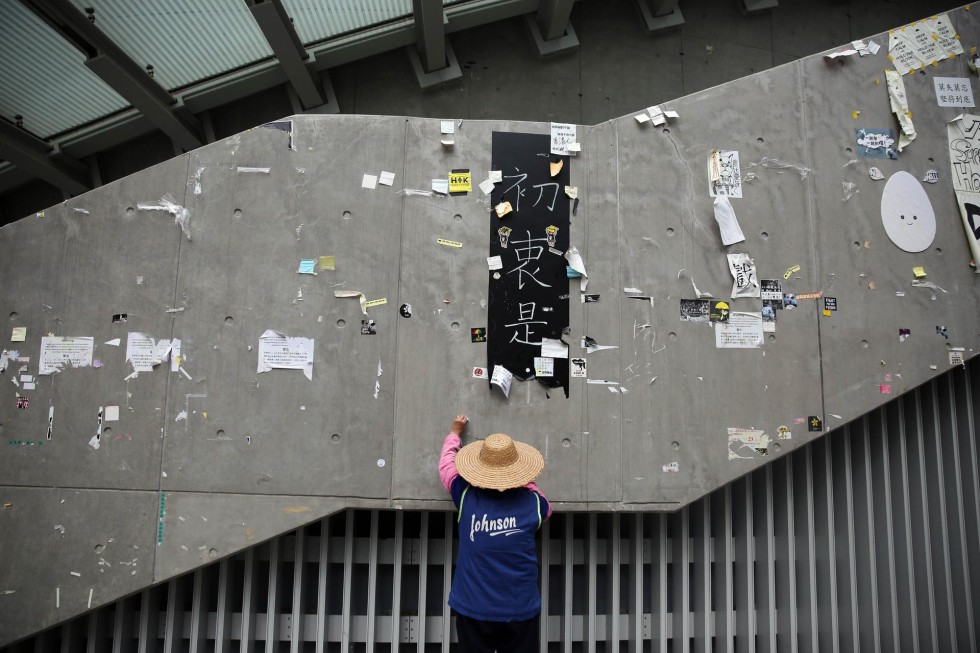
A worker cleans the area of the main pro-democracy protest site in Admiralty yesterday after the police clearance operation. Photo: AFP
For two months, Hong Kong's politics have been dominated by whether, when or how the Admiralty occupation should end. With the camp gone, the city now faces the question at the crux of the debate: how should we reform our electoral system and prevent further confrontation?
Lawmakers and academics who spoke to the South China Morning Post were generally pessimistic about the prospect of achieving universal suffrage for the election of the chief executive, as Beijing has made it clear that it will not back down.
On August 31, the National People's Congress ruled that Hong Kong could pick its leader by "one man, one vote" in 2017 - but only from a list of one or two candidates who had received the backing of at least half of a 1,200-strong nominating committee.
That decision was a trigger for the Occupy Central protests in September. Students, activists and citizens urged Beijing to scrap the ruling, saying it deprived them of a "genuine choice" of candidates.
They had hoped they could force authorities to give in, but with the clearance of the Admiralty base camp, some believe there is no more hope of a breakthrough in the 2017 constitutional reforms. And the chance of minor improvements to Beijing's framework could have also vanished, as the central government further toughens its stance.
A day before the Admiralty clearance, Chen Zuoer, the former deputy director of the Hong Kong and Macau Affairs Office, reiterated that he thought Occupy Central was Hong Kong's version of a "colour revolution", a reference to uprisings in post-Soviet states.
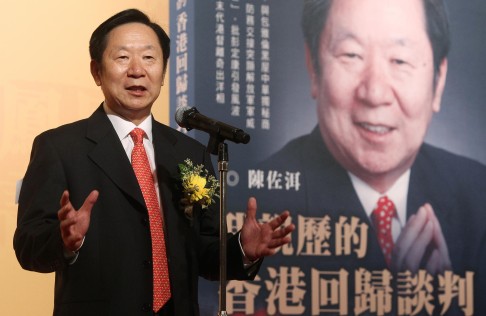
Chen Zuoer. Photo: K. Y. Cheng
In an interview with the China News Service, Chen - now the head of the Chinese Association of Hong Kong and Macau Studies - called for a "rethink and planning on how to rule Hong Kong".
He stressed the need to understand the "three pairs of concepts that must not be treated as equals". Those three pairs, he said, were the "'one country, two systems', the nation's socialist core and [Hong Kong's] original capitalist systems, and the nation's sovereignty, safety and development interests and maintaining a region's prosperity and stability".
"The actual significance of the waves of struggle surrounding the power to rule is no less than that of the 1997 handover. [The former could be] even more complicated," he said.
Chen said the association's experts believed "Hong Kong people should be prepared for a possibly long-term struggle with the force that brings calamity to Hong Kong … in aspects such as the law court, Legco, mass media, universities or even secondary schools".
The vice-chairman of the Chinese Association of Hong Kong and Macau Studies said Beijing appeared to be toughening its stance towards Hong Kong.
Professor Lau Siu-kai said: "Beijing is also kind of shocked to see people [fighting for democracy] through illegal actions … and thus inclined towards [being more] conservative," he said.
Joseph Wong Wing-ping, former civil service minister and now a public affairs commentator, believed any chance of even minor improvements to the framework announced on August 31 had gone.
Democratic Party lawmaker Wu Chi-wai said that by suggesting that national interest was more important than regional prosperity, Chen was saying that "Beijing is no longer concerned about whether Hong Kong is governable".
But Zhang Dinghuai, deputy director of Shenzhen University's Centre for Basic Laws of Hong Kong and Macau, said Chen's remarks did not mean room for political reform was limited.
"Hong Kong is a special administrative region under the central government. How can it be possible that the central government does not have a say on Hong Kong's political development?" he asked.
Zhang said reforms could only move forward when rational discussion returned.
Some local academics also believe it is not too late to restart dialogue.
Joseph Chan Cho-wai helped train the students leaders ahead of their televised meeting with Chief Secretary Carrie Lam Cheng Yuet-ngor in October.
The political scientist professor at the University of Hong Kong said that pan-democrats should now start efforts to negotiate for open elections beyond that date. "It has been clear all along that there will be no concession [by Beijing] on constitutional reform … On the other hand, it is also impossible for pan-democrats to endorse the 2017 proposal under the current situation," he said.
But Chan believed there was still something that the Hong Kong government and the pan-democratic camp could do - mainly by making use of the "multiparty platform", which Lam has pledged to consider establishing, and inviting the Federation of Students and Scholarism to join.
Lau Siu-kai also called for Beijing, the Hong Kong government and the pan-democratic camp to start rebuilding their relationships.
"The local administration can try to minimise social confrontation in its rule," Lau said. "It can also adopt a more inclusive style of governance to mend ties, and roll out policies to alleviate social grievances."
Lau also urged the pan-democratic camp to "rethink" how they want to handle their relationship with the central government.
Additional Reporting by Peter So
Now Hong Kong must face the big questions in wake of Occupy
The shouting is over and the talking must begin as the city confronts the big question of how to achieve electoral reform without confrontation
PUBLISHED : Saturday, 13 December, 2014, 1:01am
UPDATED : Saturday, 13 December, 2014, 6:56am
Tony Cheung and Fanny W. Y. Fung

A worker cleans the area of the main pro-democracy protest site in Admiralty yesterday after the police clearance operation. Photo: AFP
For two months, Hong Kong's politics have been dominated by whether, when or how the Admiralty occupation should end. With the camp gone, the city now faces the question at the crux of the debate: how should we reform our electoral system and prevent further confrontation?
Lawmakers and academics who spoke to the South China Morning Post were generally pessimistic about the prospect of achieving universal suffrage for the election of the chief executive, as Beijing has made it clear that it will not back down.
On August 31, the National People's Congress ruled that Hong Kong could pick its leader by "one man, one vote" in 2017 - but only from a list of one or two candidates who had received the backing of at least half of a 1,200-strong nominating committee.
That decision was a trigger for the Occupy Central protests in September. Students, activists and citizens urged Beijing to scrap the ruling, saying it deprived them of a "genuine choice" of candidates.
They had hoped they could force authorities to give in, but with the clearance of the Admiralty base camp, some believe there is no more hope of a breakthrough in the 2017 constitutional reforms. And the chance of minor improvements to Beijing's framework could have also vanished, as the central government further toughens its stance.
A day before the Admiralty clearance, Chen Zuoer, the former deputy director of the Hong Kong and Macau Affairs Office, reiterated that he thought Occupy Central was Hong Kong's version of a "colour revolution", a reference to uprisings in post-Soviet states.

Chen Zuoer. Photo: K. Y. Cheng
In an interview with the China News Service, Chen - now the head of the Chinese Association of Hong Kong and Macau Studies - called for a "rethink and planning on how to rule Hong Kong".
He stressed the need to understand the "three pairs of concepts that must not be treated as equals". Those three pairs, he said, were the "'one country, two systems', the nation's socialist core and [Hong Kong's] original capitalist systems, and the nation's sovereignty, safety and development interests and maintaining a region's prosperity and stability".
"The actual significance of the waves of struggle surrounding the power to rule is no less than that of the 1997 handover. [The former could be] even more complicated," he said.
Chen said the association's experts believed "Hong Kong people should be prepared for a possibly long-term struggle with the force that brings calamity to Hong Kong … in aspects such as the law court, Legco, mass media, universities or even secondary schools".
The vice-chairman of the Chinese Association of Hong Kong and Macau Studies said Beijing appeared to be toughening its stance towards Hong Kong.
Professor Lau Siu-kai said: "Beijing is also kind of shocked to see people [fighting for democracy] through illegal actions … and thus inclined towards [being more] conservative," he said.
Joseph Wong Wing-ping, former civil service minister and now a public affairs commentator, believed any chance of even minor improvements to the framework announced on August 31 had gone.
Democratic Party lawmaker Wu Chi-wai said that by suggesting that national interest was more important than regional prosperity, Chen was saying that "Beijing is no longer concerned about whether Hong Kong is governable".
But Zhang Dinghuai, deputy director of Shenzhen University's Centre for Basic Laws of Hong Kong and Macau, said Chen's remarks did not mean room for political reform was limited.
"Hong Kong is a special administrative region under the central government. How can it be possible that the central government does not have a say on Hong Kong's political development?" he asked.
Zhang said reforms could only move forward when rational discussion returned.
Some local academics also believe it is not too late to restart dialogue.
Joseph Chan Cho-wai helped train the students leaders ahead of their televised meeting with Chief Secretary Carrie Lam Cheng Yuet-ngor in October.
The political scientist professor at the University of Hong Kong said that pan-democrats should now start efforts to negotiate for open elections beyond that date. "It has been clear all along that there will be no concession [by Beijing] on constitutional reform … On the other hand, it is also impossible for pan-democrats to endorse the 2017 proposal under the current situation," he said.
But Chan believed there was still something that the Hong Kong government and the pan-democratic camp could do - mainly by making use of the "multiparty platform", which Lam has pledged to consider establishing, and inviting the Federation of Students and Scholarism to join.
Lau Siu-kai also called for Beijing, the Hong Kong government and the pan-democratic camp to start rebuilding their relationships.
"The local administration can try to minimise social confrontation in its rule," Lau said. "It can also adopt a more inclusive style of governance to mend ties, and roll out policies to alleviate social grievances."
Lau also urged the pan-democratic camp to "rethink" how they want to handle their relationship with the central government.
Additional Reporting by Peter So
[Video] 75-day time-lapse of the Occupy Causeway Bay site
<iframe src="//www.youtube.com/embed/Kpo_mrl_7Tw?rel=0&showinfo=0" allowfullscreen="" frameborder="0" height="315" width="420"></iframe>
75-day time-lapse of the Occupy Causeway Bay site (September 28 to December 12, 2014)
<iframe src="//www.youtube.com/embed/Kpo_mrl_7Tw?rel=0&showinfo=0" allowfullscreen="" frameborder="0" height="315" width="420"></iframe>
75-day time-lapse of the Occupy Causeway Bay site (September 28 to December 12, 2014)
Re: Hong Kong Students indefinite hunger strike secrets revealed
Hundreds of police to clear Hong Kong's last pro-democracy protest site
Force's low popularity rating after pro-democracy protests fail to deter police recruits
PUBLISHED : Sunday, 14 December, 2014, 2:47am
UPDATED : Sunday, 14 December, 2014, 12:00pm
Peter So and Jennifer Ngo
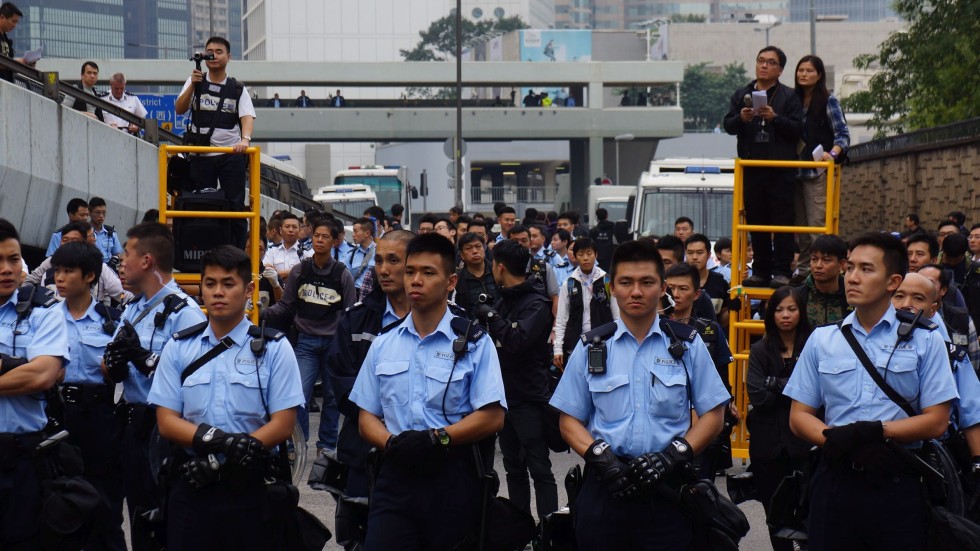
Hong Kong police clear the main pro-democracy Umbrella Movement site in Admiralty last Thursday. Photo: EPA
The last embers of the 2½-month Occupy Central campaign could be stubbed out tomorrow after police announced details of the clearance of the last protest site left standing.
The clearance of Causeway Bay will start soon after 9.30am and roads near the Yee Wo Street camp, including Jardine's Bazaar, Sugar Street and part of Gloucester Road, will be closed.
"If it goes smoothly, we hope the occupied roads could be reopened in the afternoon," said Steven Hui Chun-tak, chief superintendent of the police public relations branch.
It is understood that hundreds of police officers, rather than the thousands called up in Admiralty last week and Mong Kok last month, will be deployed. Hui urged protesters to leave voluntarily and said they would have little time to pack belongings when the clearance began.
Only a few dozen protesters remained at the site yesterday. Some assembled their own version of the "Lennon Wall", the landmark in the Admiralty camp where people left messages of support for the protests.
WATCH: 75-day time lapse of the protests in Causeway Bay
<iframe src="//www.youtube.com/embed/Kpo_mrl_7Tw?rel=0&showinfo=0" allowfullscreen="" frameborder="0" height="315" width="420"></iframe>
Amid warnings from Occupy co-founder Benny Tai Yiu-ting that frustrated protesters could turn more radical, Hui said more officers would be deployed to counter the latest protest tactic, so-called shopping trips.
The "shopping" exercises have sprung up since the Mong Kok clearance and see protesters stand or move slowly through crowded shopping areas. On Friday, protesters defied police warnings as they sang carols dressed in choir garb while holding pro-democracy banners at Times Square in Causeway Bay.
Yesterday, a government spokesman revealed that the organisers of the annual New Year countdown at Times Square had withdrawn their plan for this year's celebration. Hui said police had not been consulted on the matter.
Separately, images of clashes between "Asia's finest" and protesters seemed not to have put potential officers off a career in the force. The first recruitment day since the 75-day sit-in at Admiralty ended saw potential recruits crowd into Auxiliary Police Headquarters in Kowloon Bay.
A police spokesman said more than 1,500 applications were received yesterday for posts at various ranks, slightly up on the 1,400 received at last year's winter recruitment day.
For Lingnan University philosophy graduate Matthew Chan, 23, Occupy was one of the reasons that spurred him to join the force.
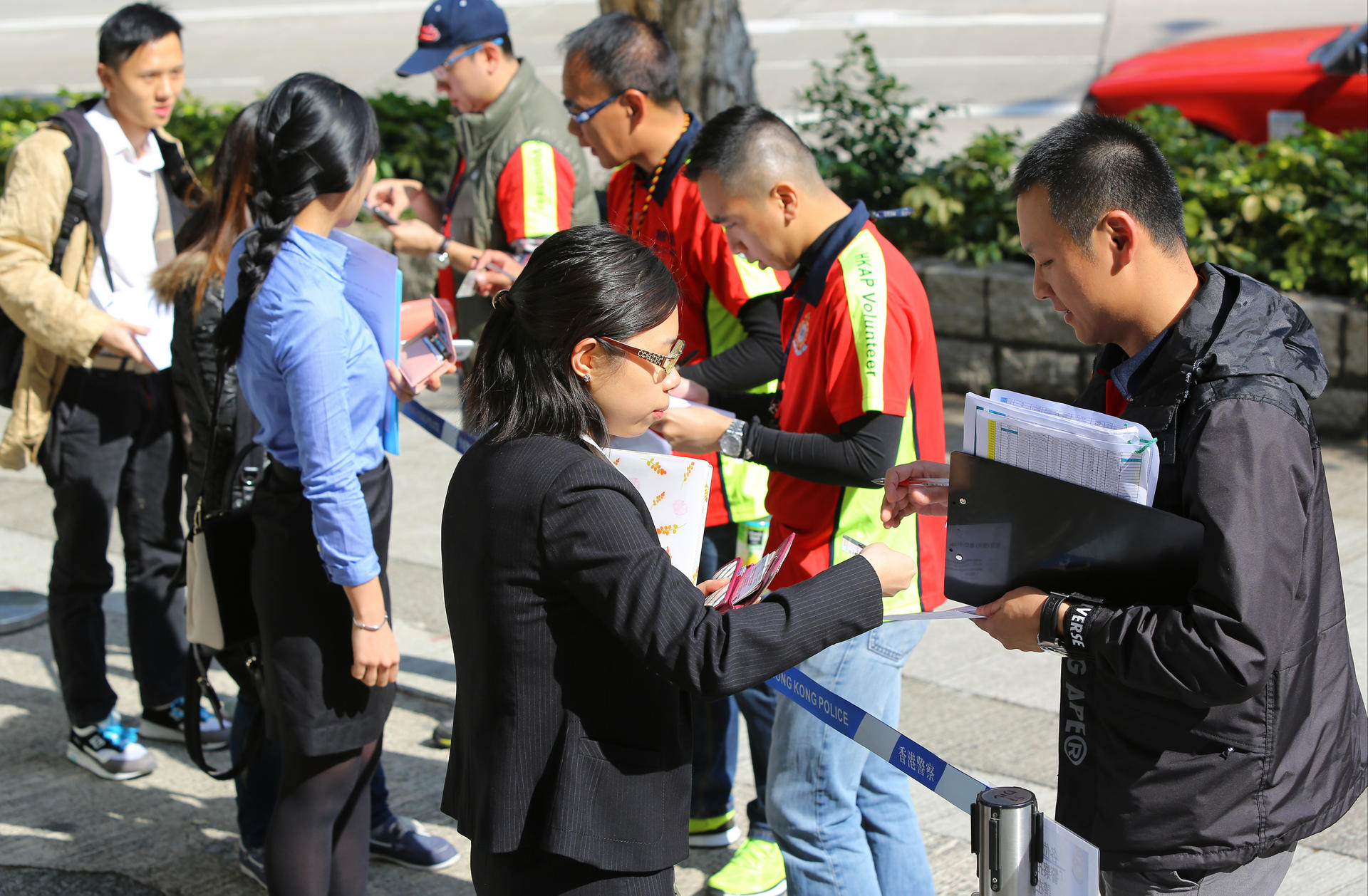
Potential police officers are interviewed during recruitment day yesterday at police HQ in Kowloon Bay. Photo: Edmond So
"There were some parts [in the movement that] the police didn't handle well. So even more so it's important to have people who want to work on those things to join the force," he said. "I think the rule of law is so important - it needs to be upheld."
Another potential recruit agreed that Occupy had not put her off policing.
"A city cannot be without the police and protective services," said the 28-year-old woman, who works in information technology. "Protective services are never a popular vocation - I'm not joining the force because it's a popular job."
Jeffrey Ho, 28, who graduated with a degree in forensic-science research in Australia, said he had always wanted to join the police.
He said officers needed to obey commands from their superiors or else "it wouldn't be a police force".
He said if he were in a situation where he thought orders were not appropriate, he would discuss it with his superiors and try to come up with a better way.
A police spokesman said the force expected to meet its target of recruiting 230 probationary inspectors and 1,100 constables by the end of the fiscal year in March.
Hundreds of police to clear Hong Kong's last pro-democracy protest site
Force's low popularity rating after pro-democracy protests fail to deter police recruits
PUBLISHED : Sunday, 14 December, 2014, 2:47am
UPDATED : Sunday, 14 December, 2014, 12:00pm
Peter So and Jennifer Ngo

Hong Kong police clear the main pro-democracy Umbrella Movement site in Admiralty last Thursday. Photo: EPA
The last embers of the 2½-month Occupy Central campaign could be stubbed out tomorrow after police announced details of the clearance of the last protest site left standing.
The clearance of Causeway Bay will start soon after 9.30am and roads near the Yee Wo Street camp, including Jardine's Bazaar, Sugar Street and part of Gloucester Road, will be closed.
"If it goes smoothly, we hope the occupied roads could be reopened in the afternoon," said Steven Hui Chun-tak, chief superintendent of the police public relations branch.
It is understood that hundreds of police officers, rather than the thousands called up in Admiralty last week and Mong Kok last month, will be deployed. Hui urged protesters to leave voluntarily and said they would have little time to pack belongings when the clearance began.
Only a few dozen protesters remained at the site yesterday. Some assembled their own version of the "Lennon Wall", the landmark in the Admiralty camp where people left messages of support for the protests.
WATCH: 75-day time lapse of the protests in Causeway Bay
<iframe src="//www.youtube.com/embed/Kpo_mrl_7Tw?rel=0&showinfo=0" allowfullscreen="" frameborder="0" height="315" width="420"></iframe>
Amid warnings from Occupy co-founder Benny Tai Yiu-ting that frustrated protesters could turn more radical, Hui said more officers would be deployed to counter the latest protest tactic, so-called shopping trips.
The "shopping" exercises have sprung up since the Mong Kok clearance and see protesters stand or move slowly through crowded shopping areas. On Friday, protesters defied police warnings as they sang carols dressed in choir garb while holding pro-democracy banners at Times Square in Causeway Bay.
Yesterday, a government spokesman revealed that the organisers of the annual New Year countdown at Times Square had withdrawn their plan for this year's celebration. Hui said police had not been consulted on the matter.
Separately, images of clashes between "Asia's finest" and protesters seemed not to have put potential officers off a career in the force. The first recruitment day since the 75-day sit-in at Admiralty ended saw potential recruits crowd into Auxiliary Police Headquarters in Kowloon Bay.
A police spokesman said more than 1,500 applications were received yesterday for posts at various ranks, slightly up on the 1,400 received at last year's winter recruitment day.
For Lingnan University philosophy graduate Matthew Chan, 23, Occupy was one of the reasons that spurred him to join the force.

Potential police officers are interviewed during recruitment day yesterday at police HQ in Kowloon Bay. Photo: Edmond So
"There were some parts [in the movement that] the police didn't handle well. So even more so it's important to have people who want to work on those things to join the force," he said. "I think the rule of law is so important - it needs to be upheld."
Another potential recruit agreed that Occupy had not put her off policing.
"A city cannot be without the police and protective services," said the 28-year-old woman, who works in information technology. "Protective services are never a popular vocation - I'm not joining the force because it's a popular job."
Jeffrey Ho, 28, who graduated with a degree in forensic-science research in Australia, said he had always wanted to join the police.
He said officers needed to obey commands from their superiors or else "it wouldn't be a police force".
He said if he were in a situation where he thought orders were not appropriate, he would discuss it with his superiors and try to come up with a better way.
A police spokesman said the force expected to meet its target of recruiting 230 probationary inspectors and 1,100 constables by the end of the fiscal year in March.
Re: Hong Kong Students indefinite hunger strike secrets revealed
Occupy groups to start 'non-cooperation movement' as follow-up to mass protests
Hongkongers urged to break up tax payments into small amounts and to delay paying rent
PUBLISHED : Sunday, 14 December, 2014, 2:23pm
UPDATED : Sunday, 14 December, 2014, 2:25pm
Joyce Ng [email protected]
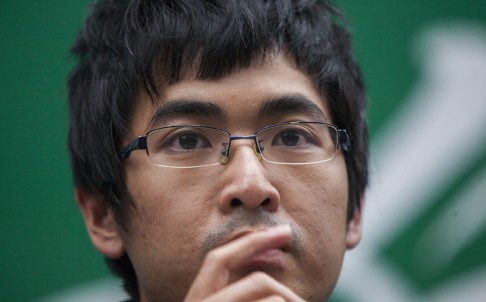
Student activist Alex Chow Yong-kang. Photo: EPA
Students and civil groups are launching a “non-cooperation movement” – urging people to delay paying their rent and to pay their tax bills in trickles – as an offshoot of the Occupy pro-democracy protests.
Alex Chow Yong-kang, secretary general of the Federation of Students, said in a press conference this morning that the actions were “entirely legal” and hoped to draw the participation of busy workers who were unable to join the months-long protests.
“Occupy is transforming into different forms,” Chow said. “While the government has no timetable for universal suffrage, we do have a timetable to fight for it and challenge the legitimacy of the government.”
The call comes after police dismantled protesters’ strongly fortified encampment in Admiralty last week and reopened the streets to vehicles. Days earlier, officers also pushed out protesters from their sit-in camp in Mong Kok.
Police now plan to clear the last remaining protest camp in Causeway Bay on Monday.
Under the non-cooperation plan, Hongkongers are urged to express their displeasure at the government and the current political system by splitting their tax payments into small sums and for tenants to delay paying their rent till the last possible moment.
Franklen Choi Kin-shing, a community college lecturer in social science, suggests people split their payments into cheques worth HK$689 or HK$6.89 – a mocking reference to the number of people in an election committee that elected the current chief executive, Leung Chun-ying.
“The unrepresentative government has no right to collect taxes from the people,” Choi said, but people should pay using tricks rather than default on the bill altogether.
“This would bring pressure on civil servants, but all sorts of non-cooperation movements inevitably do that,” he said, adding the idea had been circulated among Occupy protesters in the past month.
However, Occupy will not launch a mass protest on the level it did for more than 70 days, paralysing several roads and capturing the world’s attention.
“Neither Scholarism nor the Federation of Students will call for any large-scale occupy or civil disobedience actions in the short term,” said Scholarism spokesman Oscar Lai Man-lok at a radio interview this morning.
“Scholarism hopes to go to the community [to spread our ideas], and during the second-stage of consultation [on political reform], we may, as we did before, follow the officials and make ourselves heard both inside and outside the venue [of officials’ town hall meetings].”
On the clearance of the last occupy site at Causeway Bay which police yesterday said would happen on Monday morning, Lai expected it would go smoothly as those who remain there made it clear that they would offer no resistance and had already started packing.
Speaking about the new action following the protests’ close, Choi said protesting through the tax bill has been historically employed in the United States and Britain to protest war or fight for women’s right to vote.
There are 1.74 million tax-paying individuals and 2.3 million residents of public housing in Hong Kong. High housing costs and the inability of the younger generation to get on the property ladder has been widely said to be one of the issues that drove people to the streets during the Occupy protests.
An alliance of public housing tenants said some residents had in the past deferred their payments to protest the government’s refusal to cut the rent in an economic downturn.
It said it would promote the idea among residents in as many as possible of the 180 housing estates, hoping that the first attempt would start on December.
With additional reporting from Samuel Chan
Occupy groups to start 'non-cooperation movement' as follow-up to mass protests
Hongkongers urged to break up tax payments into small amounts and to delay paying rent
PUBLISHED : Sunday, 14 December, 2014, 2:23pm
UPDATED : Sunday, 14 December, 2014, 2:25pm
Joyce Ng [email protected]

Student activist Alex Chow Yong-kang. Photo: EPA
Students and civil groups are launching a “non-cooperation movement” – urging people to delay paying their rent and to pay their tax bills in trickles – as an offshoot of the Occupy pro-democracy protests.
Alex Chow Yong-kang, secretary general of the Federation of Students, said in a press conference this morning that the actions were “entirely legal” and hoped to draw the participation of busy workers who were unable to join the months-long protests.
“Occupy is transforming into different forms,” Chow said. “While the government has no timetable for universal suffrage, we do have a timetable to fight for it and challenge the legitimacy of the government.”
The call comes after police dismantled protesters’ strongly fortified encampment in Admiralty last week and reopened the streets to vehicles. Days earlier, officers also pushed out protesters from their sit-in camp in Mong Kok.
Police now plan to clear the last remaining protest camp in Causeway Bay on Monday.
Under the non-cooperation plan, Hongkongers are urged to express their displeasure at the government and the current political system by splitting their tax payments into small sums and for tenants to delay paying their rent till the last possible moment.
Franklen Choi Kin-shing, a community college lecturer in social science, suggests people split their payments into cheques worth HK$689 or HK$6.89 – a mocking reference to the number of people in an election committee that elected the current chief executive, Leung Chun-ying.
“The unrepresentative government has no right to collect taxes from the people,” Choi said, but people should pay using tricks rather than default on the bill altogether.
“This would bring pressure on civil servants, but all sorts of non-cooperation movements inevitably do that,” he said, adding the idea had been circulated among Occupy protesters in the past month.
However, Occupy will not launch a mass protest on the level it did for more than 70 days, paralysing several roads and capturing the world’s attention.
“Neither Scholarism nor the Federation of Students will call for any large-scale occupy or civil disobedience actions in the short term,” said Scholarism spokesman Oscar Lai Man-lok at a radio interview this morning.
“Scholarism hopes to go to the community [to spread our ideas], and during the second-stage of consultation [on political reform], we may, as we did before, follow the officials and make ourselves heard both inside and outside the venue [of officials’ town hall meetings].”
On the clearance of the last occupy site at Causeway Bay which police yesterday said would happen on Monday morning, Lai expected it would go smoothly as those who remain there made it clear that they would offer no resistance and had already started packing.
Speaking about the new action following the protests’ close, Choi said protesting through the tax bill has been historically employed in the United States and Britain to protest war or fight for women’s right to vote.
There are 1.74 million tax-paying individuals and 2.3 million residents of public housing in Hong Kong. High housing costs and the inability of the younger generation to get on the property ladder has been widely said to be one of the issues that drove people to the streets during the Occupy protests.
An alliance of public housing tenants said some residents had in the past deferred their payments to protest the government’s refusal to cut the rent in an economic downturn.
It said it would promote the idea among residents in as many as possible of the 180 housing estates, hoping that the first attempt would start on December.
With additional reporting from Samuel Chan
Re: Hong Kong Students indefinite hunger strike secrets revealed
Sinkies don't dare to protest on the streets
Maybe they can be like Sim Lim Ah Beng
Pay their Gahbrament bills in lots of coins
Keep civil serpents busy counting peanuts
Occupy groups to start 'non-cooperation movement' as follow-up to mass protests
Hongkongers urged to break up tax payments into small amounts and to delay paying rent
...........
Under the non-cooperation plan, Hongkongers are urged to express their displeasure at the government and the current political system by splitting their tax payments into small sums and for tenants to delay paying their rent till the last possible moment.
Franklen Choi Kin-shing, a community college lecturer in social science, suggests people split their payments into cheques worth HK$689 or HK$6.89 – a mocking reference to the number of people in an election committee that elected the current chief executive, Leung Chun-ying.
“The unrepresentative government has no right to collect taxes from the people,” Choi said, but people should pay using tricks rather than default on the bill altogether.
“This would bring pressure on civil servants, but all sorts of non-cooperation movements inevitably do that,” he said, adding the idea had been circulated among Occupy protesters in the past month.
...............
Speaking about the new action following the protests’ close, Choi said protesting through the tax bill has been historically employed in the United States and Britain to protest war or fight for women’s right to vote.
Sinkies don't dare to protest on the streets
Maybe they can be like Sim Lim Ah Beng
Pay their Gahbrament bills in lots of coins
Keep civil serpents busy counting peanuts
Re: HK Protest Leaders High! Demands Talks With 11 Jinping In Peking!
Anti-Occupy activist Leticia Lee looks ahead to her next fight
Leticia Lee, a fiery opponent of Occupy since it began, plans to take her fight 'to the next level'
PUBLISHED : Monday, 15 December, 2014, 3:35am
UPDATED : Monday, 15 December, 2014, 3:35am
Tony Cheung [email protected]
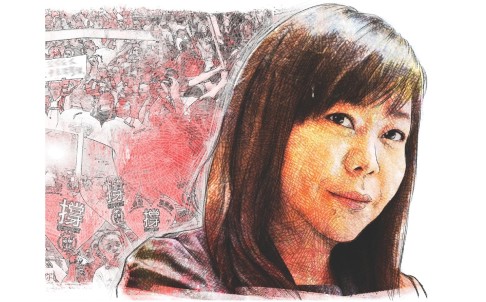
An anti-occupy activist looks ahead
As the Occupy campaign winds down with the Causeway Bay protest site due to be cleared today, for anti-Occupy activist Leticia Lee See-yin, the fight "for justice" is not over yet.
And as student leaders and activists called for residents to engage in a "non-cooperation movement" against the local government yesterday, Lee also told the South China Morning Post that she might take her actions "to the next level if the thugs" escalate theirs.
She said she would continue to oppose the social and political movement that manifested with Occupy, by organising actions such as public forums at which pro-government activists could trade ideas. She also plans to coordinate with her supporters and allies to decide on a new course of action, should the current pro-democracy movement continue in some form.
"Those who protested peacefully are not thugs. But the three organisers of Occupy Central, the student leaders and the radicals who stormed [the Legislative Council last month] and charged the police's cordon are … and the pan-democrats are their accomplices," Lee said.
Lee made a name for herself in 2012, as she led the Parents' Association in supporting the government's plan to launch national education in secondary schools. After the plan was shelved due to heated public criticism, Lee turned her attention to opposing the Occupy Central campaign, which was founded in March last year. In August last year, Lee also co-organised a controversial campaign "against obscenity" after an outspoken teacher was filmed shouting foul language at police officers over their handling of a civic dispute.
Her fiery approach raised questions about her motivation, but in an interview with the Post, Lee denied she was paid or instructed to undertake those campaigns by anyone in the local or central governments.
"To say that we do this for money is an insult to all Hong Kong citizens … [because] my actions are simply the consequences of what those thugs have done to our city. If they take their action to the next level, so will I," she said.
Lee, who runs an advertising and production partnership, said the pro-government campaigns cost hundreds of thousands of dollars, and all the money came from her pocket or from supporters with no official or political party affiliation.
Since 2012, Lee's group and other pro-Beijing bodies such as Caring Hong Kong Power and the Alliance for Peace and Democracy, have been criticised for worsening the political divide.
But Lee rejected that suggestion, saying "Lee See-yin is incapable of dividing society. What divides Hong Kong is actually Next Media, the pan-democrats and the radicals.
In fact, she said, "I think Hong Kong is becoming more united. My group represents the silent majority and the middle class, who just want Hong Kong to be stable and progressive."
Civic Party lawmaker Kenneth Chan Ka-lok also said it was "irresponsible" for Lee to blame his camp for dividing Hong Kong. He said all political organisations, including those supportive of the government, have "the responsibility to [help resolve] the government's difficulties and crisis … not turning a blind eye to it or bullying others."
Contrary to Lee's accusations, Jimmy Lai Chee-ying, who yesterday stepped down as Next Media chairman, has urged protesters to consider retreating since November. Lai resigned as the publisher of the Next Media publication Apple Daily after he was arrested when the police ended the Admiralty sit-in on Thursday. He could not be reached for comment yesterday.
But while she loudly defends the government, Lee emphasised that she was not "blindly supportive" of it and the police.
"Had [the Occupy protesters] cleared out peacefully but the police used violence on them, I would have been the first to condemn the police," she said.
Last month, Chief Executive Leung Chun-ying said a government task force had been set up to help young Hongkongers get ahead in life, as a lack of upward mobility was one of the reasons young people joined the Occupy protests.
"He should have been doing that all along," Lee said.
Occupy Central co-founder Dr Chan Kin-man said Lee was looking at Hong Kong's problems "too superficially".
Chan, a Chinese University sociologist, said the city's social division originated from the debate about universal suffrage and the city's unequal politics.
"If the national legislature had ruled on August 31 that Hong Kong would have a truly competitive popular election" for the chief executive in 2017, "the majority of Hongkongers would have supported it", Chan said.
"So people like Lee should have the wisdom to know that the [core] of the problem is that we have a political system that lags behind our social progress."
Chan was referring to the National People's Congress decision that while Hongkongers could vote for the chief executive in 2017, only two or three candidates who gained the support of a 1,200-strong nominating committee could run, thereby allowing Beijing to vet candidates.
That announcement triggered the Occupy Central protests in late September, with protesters camping in Mong Kok, Admiralty and Causeway Bay.
Lee, a single parent with a 20-year-old son, said that while she was focused on education in the past, Occupy Central prompted her political interest.
"I was escaping from politics in the past … but later I realised that education is interconnected with politics and people's livelihoods," she said.
Lee has called Occupy's co-founders, as well as Lai and others, "shameless, rubbish, sinners" and even "betrayers of God". She has also faced "malicious" attacks from detractors.
"Not only have we seen the offensive edited pictures of me on the internet, I have been accused of being a prostitute. My family and I have endured a great deal of pressure, but they understand that I will never surrender to injustice and I will always speak up for the community," she said.
____________________________________
Leticia Lee
2006-11: Chairwoman, David Li Kwok Po College Parent-Teacher Association
Since 2007: President, Federation of Parent-Teacher Associations of Yau Tsim Mong District
Since November 2010: Founding president, Parents' Association of Hong Kong
2012: Led campaign backing controversial national education curriculum
2013: Co-organised campaign "against obscenity"
2013: Founded the Justice Alliance, an anti-Occupy Central group
2014: Launched "blue ribbon" movement supporting police
Anti-Occupy activist Leticia Lee looks ahead to her next fight
Leticia Lee, a fiery opponent of Occupy since it began, plans to take her fight 'to the next level'
PUBLISHED : Monday, 15 December, 2014, 3:35am
UPDATED : Monday, 15 December, 2014, 3:35am
Tony Cheung [email protected]

An anti-occupy activist looks ahead
As the Occupy campaign winds down with the Causeway Bay protest site due to be cleared today, for anti-Occupy activist Leticia Lee See-yin, the fight "for justice" is not over yet.
And as student leaders and activists called for residents to engage in a "non-cooperation movement" against the local government yesterday, Lee also told the South China Morning Post that she might take her actions "to the next level if the thugs" escalate theirs.
She said she would continue to oppose the social and political movement that manifested with Occupy, by organising actions such as public forums at which pro-government activists could trade ideas. She also plans to coordinate with her supporters and allies to decide on a new course of action, should the current pro-democracy movement continue in some form.
"Those who protested peacefully are not thugs. But the three organisers of Occupy Central, the student leaders and the radicals who stormed [the Legislative Council last month] and charged the police's cordon are … and the pan-democrats are their accomplices," Lee said.
Lee made a name for herself in 2012, as she led the Parents' Association in supporting the government's plan to launch national education in secondary schools. After the plan was shelved due to heated public criticism, Lee turned her attention to opposing the Occupy Central campaign, which was founded in March last year. In August last year, Lee also co-organised a controversial campaign "against obscenity" after an outspoken teacher was filmed shouting foul language at police officers over their handling of a civic dispute.
Her fiery approach raised questions about her motivation, but in an interview with the Post, Lee denied she was paid or instructed to undertake those campaigns by anyone in the local or central governments.
"To say that we do this for money is an insult to all Hong Kong citizens … [because] my actions are simply the consequences of what those thugs have done to our city. If they take their action to the next level, so will I," she said.
Lee, who runs an advertising and production partnership, said the pro-government campaigns cost hundreds of thousands of dollars, and all the money came from her pocket or from supporters with no official or political party affiliation.
Since 2012, Lee's group and other pro-Beijing bodies such as Caring Hong Kong Power and the Alliance for Peace and Democracy, have been criticised for worsening the political divide.
But Lee rejected that suggestion, saying "Lee See-yin is incapable of dividing society. What divides Hong Kong is actually Next Media, the pan-democrats and the radicals.
In fact, she said, "I think Hong Kong is becoming more united. My group represents the silent majority and the middle class, who just want Hong Kong to be stable and progressive."
Civic Party lawmaker Kenneth Chan Ka-lok also said it was "irresponsible" for Lee to blame his camp for dividing Hong Kong. He said all political organisations, including those supportive of the government, have "the responsibility to [help resolve] the government's difficulties and crisis … not turning a blind eye to it or bullying others."
Contrary to Lee's accusations, Jimmy Lai Chee-ying, who yesterday stepped down as Next Media chairman, has urged protesters to consider retreating since November. Lai resigned as the publisher of the Next Media publication Apple Daily after he was arrested when the police ended the Admiralty sit-in on Thursday. He could not be reached for comment yesterday.
But while she loudly defends the government, Lee emphasised that she was not "blindly supportive" of it and the police.
"Had [the Occupy protesters] cleared out peacefully but the police used violence on them, I would have been the first to condemn the police," she said.
Last month, Chief Executive Leung Chun-ying said a government task force had been set up to help young Hongkongers get ahead in life, as a lack of upward mobility was one of the reasons young people joined the Occupy protests.
"He should have been doing that all along," Lee said.
Occupy Central co-founder Dr Chan Kin-man said Lee was looking at Hong Kong's problems "too superficially".
Chan, a Chinese University sociologist, said the city's social division originated from the debate about universal suffrage and the city's unequal politics.
"If the national legislature had ruled on August 31 that Hong Kong would have a truly competitive popular election" for the chief executive in 2017, "the majority of Hongkongers would have supported it", Chan said.
"So people like Lee should have the wisdom to know that the [core] of the problem is that we have a political system that lags behind our social progress."
Chan was referring to the National People's Congress decision that while Hongkongers could vote for the chief executive in 2017, only two or three candidates who gained the support of a 1,200-strong nominating committee could run, thereby allowing Beijing to vet candidates.
That announcement triggered the Occupy Central protests in late September, with protesters camping in Mong Kok, Admiralty and Causeway Bay.
Lee, a single parent with a 20-year-old son, said that while she was focused on education in the past, Occupy Central prompted her political interest.
"I was escaping from politics in the past … but later I realised that education is interconnected with politics and people's livelihoods," she said.
Lee has called Occupy's co-founders, as well as Lai and others, "shameless, rubbish, sinners" and even "betrayers of God". She has also faced "malicious" attacks from detractors.
"Not only have we seen the offensive edited pictures of me on the internet, I have been accused of being a prostitute. My family and I have endured a great deal of pressure, but they understand that I will never surrender to injustice and I will always speak up for the community," she said.
____________________________________
Leticia Lee
2006-11: Chairwoman, David Li Kwok Po College Parent-Teacher Association
Since 2007: President, Federation of Parent-Teacher Associations of Yau Tsim Mong District
Since November 2010: Founding president, Parents' Association of Hong Kong
2012: Led campaign backing controversial national education curriculum
2013: Co-organised campaign "against obscenity"
2013: Founded the Justice Alliance, an anti-Occupy Central group
2014: Launched "blue ribbon" movement supporting police
Re: HK Protest Leaders High! Demands Talks With 11 Jinping In Peking!
PUBLISHED : Monday, 15 December, 2014, 6:37am
UPDATED : Monday, 15 December, 2014, 6:37am
Post Occupy, Hong Kong must confront the hatred that poisons - in our own hearts
Alice Wu says after Occupy, we must root out the hatred that seems entrenched now in the community - by taking a hard look at ourselves

Alice Wu
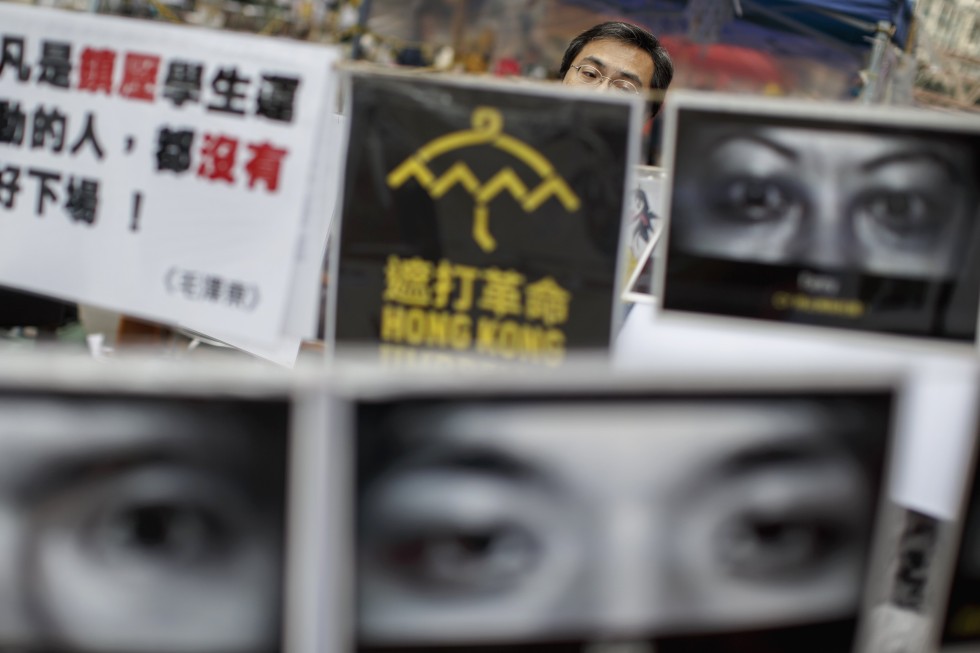
We should reflect on the role each of us play in our society's division. Photo: Reuters
Clearing the streets will not clear the pain and suffering that have been inflicted on this city. We are all bleeding; no one has been spared. And neither is anyone singularly at fault.
We've lost our community. Long before the umbrella movement, the threads of civil society had begun to unravel. Some tried to warn us. One person, in particular, has been doing so for years. In fact, his annual Christmas messages plotted our unravelling.
The archbishop of the Hong Kong Anglican Church, Dr Paul Kwong - someone some of us have learned to love to hate, and hate to love - asked us, in 2009, to notice our easy acceptance of the not-in-my-backyard mentality; in 2010, to acknowledge our own role - our selfishness - in widening the wealth gap; in 2011, to be aware of our growing preference for mutual disrespect; in 2012, to see the futility in both improper governance and sensationalism, and the danger both have in propelling society into the "periphery of inhumanity"; and, last year, to return to reconciliation, civility and dialogue against the tendency to reach for hate and violence. Self-awareness is a difficult thing to ask, indeed.
It's easy to shut our ears to content we deem unsavoury. And, as a result, we've failed to see that hate does beget hate, and violence, violence. We let differences become a breeding ground for animosity and hatred. Tens of thousands may have been called to the streets to occupy with "love and peace", but we're now left with the organisers' love's labour's lost; what will remain with us are the anguish, hate and the violence that permeated well beyond the Occupy skirmishes.
We have nestled too comfortably in our echo chambers of confirmation bias, found excuses to shut out dissent, to silence and drown out differences. We've taken our grievances as entitlements to unleash our anguish on our neighbours and friends. We've failed to see that we weren't going for the root of our problems, but for each other's jugular.
We desperately now, as a community, need to rebuild what we have, as a community, destroyed. We have to reclaim normalcy, not as fools in sectioned-off communities separated by the colour of our ribbons, but as friends learning again to live together.
This is our only way out, and we must listen to those who have suffered from unadulterated hate and violence. Journalist Kevin Lau Chun-to, who was stabbed in February, penned a moving plea this month to not let hatred take hold of us. For someone who has experienced anguish unimaginable to most, Lau's plea must not be taken lightly.
We must dig out the weeds of hate from our community, as painful as it may be, by being brutally honest and harshly introspective. Our extenuating circumstances call for restraint from accentuating the divisive lines we've drawn. We must not let hatred occupy our hearts and minds.
Not all need be lost; if we learn how easily we fell apart, how easily we let differences turn into hate, we can learn to, as James Thurber once said, "not look back in anger, nor forward in fear, but around in awareness".
Alice Wu is a political consultant and a former associate director of the Asia Pacific Media Network at UCLA
PUBLISHED : Monday, 15 December, 2014, 6:37am
UPDATED : Monday, 15 December, 2014, 6:37am
Post Occupy, Hong Kong must confront the hatred that poisons - in our own hearts
Alice Wu says after Occupy, we must root out the hatred that seems entrenched now in the community - by taking a hard look at ourselves

Alice Wu

We should reflect on the role each of us play in our society's division. Photo: Reuters
Clearing the streets will not clear the pain and suffering that have been inflicted on this city. We are all bleeding; no one has been spared. And neither is anyone singularly at fault.
We've lost our community. Long before the umbrella movement, the threads of civil society had begun to unravel. Some tried to warn us. One person, in particular, has been doing so for years. In fact, his annual Christmas messages plotted our unravelling.
The archbishop of the Hong Kong Anglican Church, Dr Paul Kwong - someone some of us have learned to love to hate, and hate to love - asked us, in 2009, to notice our easy acceptance of the not-in-my-backyard mentality; in 2010, to acknowledge our own role - our selfishness - in widening the wealth gap; in 2011, to be aware of our growing preference for mutual disrespect; in 2012, to see the futility in both improper governance and sensationalism, and the danger both have in propelling society into the "periphery of inhumanity"; and, last year, to return to reconciliation, civility and dialogue against the tendency to reach for hate and violence. Self-awareness is a difficult thing to ask, indeed.
It's easy to shut our ears to content we deem unsavoury. And, as a result, we've failed to see that hate does beget hate, and violence, violence. We let differences become a breeding ground for animosity and hatred. Tens of thousands may have been called to the streets to occupy with "love and peace", but we're now left with the organisers' love's labour's lost; what will remain with us are the anguish, hate and the violence that permeated well beyond the Occupy skirmishes.
We have nestled too comfortably in our echo chambers of confirmation bias, found excuses to shut out dissent, to silence and drown out differences. We've taken our grievances as entitlements to unleash our anguish on our neighbours and friends. We've failed to see that we weren't going for the root of our problems, but for each other's jugular.
We desperately now, as a community, need to rebuild what we have, as a community, destroyed. We have to reclaim normalcy, not as fools in sectioned-off communities separated by the colour of our ribbons, but as friends learning again to live together.
This is our only way out, and we must listen to those who have suffered from unadulterated hate and violence. Journalist Kevin Lau Chun-to, who was stabbed in February, penned a moving plea this month to not let hatred take hold of us. For someone who has experienced anguish unimaginable to most, Lau's plea must not be taken lightly.
We must dig out the weeds of hate from our community, as painful as it may be, by being brutally honest and harshly introspective. Our extenuating circumstances call for restraint from accentuating the divisive lines we've drawn. We must not let hatred occupy our hearts and minds.
Not all need be lost; if we learn how easily we fell apart, how easily we let differences turn into hate, we can learn to, as James Thurber once said, "not look back in anger, nor forward in fear, but around in awareness".
Alice Wu is a political consultant and a former associate director of the Asia Pacific Media Network at UCLA
Re: HK Protest Leaders High! Demands Talks With 11 Jinping In Peking!
‘Occupy is over’: Hong Kong chief executive announces end to protests as Causeway Bay is cleared
PUBLISHED : Monday, 15 December, 2014, 9:41am
UPDATED : Monday, 15 December, 2014, 7:08pm
Samuel Chan, Alan Yu, Tony Cheung and Ng Kang-chung
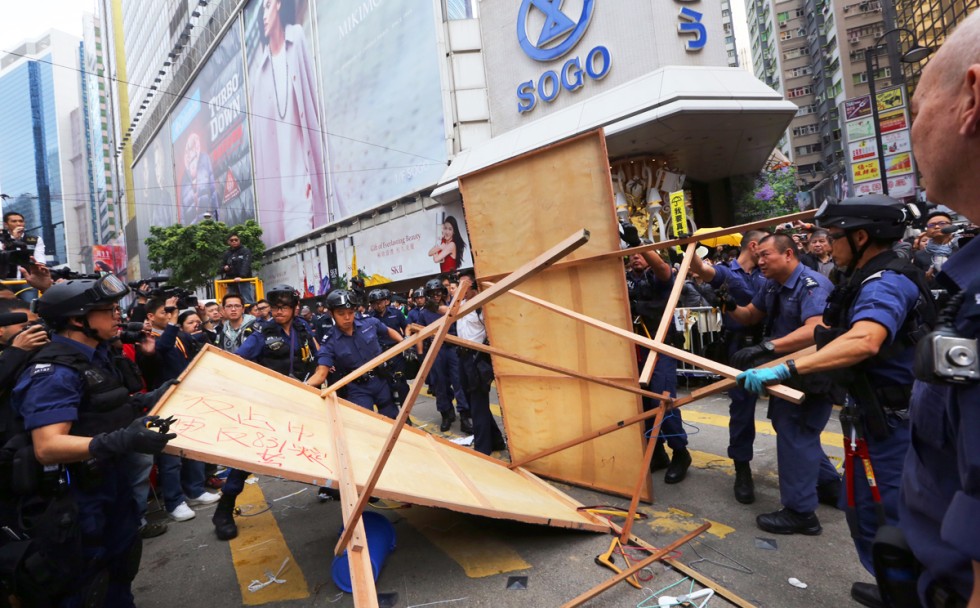
Police have started clearing the camp in front of the Sogo shopping mall. Photo: Sam Tsang
Hong Kong’s leader declared an end to 78 days of mass protests by pro-democracy demonstrators after police today cleared the last major camp and arrested 20 peaceful protesters.
“With the completion of the clearance work in the occupation site in Causeway Bay, the illegal occupation action that has lasted for more than two months in Hongkong is over," Chief Executive Leung Chun-ying said, adding that they had caused a “serious loss” to the local economy and damaged the rule of law.
“Now I think we should reflect on an important issue. That is, what is the kind of democracy that Hong Kong should pursue? I think it should be ‘democracy with the rule of law' that Hong Kong, as well as other advanced democracies, are pursuing,” said Leung, speaking to reporters after a ceremony of a local foundation.
“If we only talk about democracy, but not rule of law. It is not true democracy. It is only anarchy,” he added.
The last blow was when security guards cleared a small pro-democracy camp outside the Legislative Council that demonstrators had already retreated from.
A total of 955 people had been arrested as of today for offences relating to the Occupy protests.,police said on Monday night. Some 130 police officers were injured during the protests and 221 protesters received medical treatment through arrangements made by police.
Police received complaints from 1,972 members of the public, of which 106 have been classified as reportable complaints to be put under police watchdog's scrutiny. Most complaints involve neglect of duty and unnecessary use of authority.
Among the complainants, 137 are the aggrieved or directly-affected parties, while the rest police say are members of the public who made complaints after watching footage in the media or online. So far, 75 people have turned themselves in to the police.
By the 3pm clearance deadline, nearly all of the protesters' tents and belongings at the building's drop-off entrance for cars and the adjacent piazza had been packed up voluntarily. Just a flotsam of rubbish, boxes and plastic bags remained in front of the building.
About 10 protesters stayed briefly, but were keen to avoid possible arrest. A performance artist, Au Yeung Tung, who is also a member of the pro-democratic party ADLP, arrived and started shuffling in slow-motion to illustrate the "pace of democracy in Hong Kong over the years".
The last person to take a stand inside that specific area was 60-year-old retired teacher Fung Tak-wah, who refused to leave, and had to be picked up and carried out by security guards.
As workers quickly cleaned up the Legco site, a demonstrator started playing music, adopted by the Umbrella Movement, on a small speaker. The area was declared temporarily off-limits to all people except cleaners, who scraped posters stuck to the walls and swept up debris.
Others refused to give up the cause - the push for a free choice in the election - even if it meant protesting by their lonesome. Tai Kwai-heung, 61, pitched a tent on Tim Mei Avenue near the government headquarters, indignant that the demonstrators were shut out of Legco.
"I may not live for very long, but I'm worried for my children and grandchildren. That's why I'm here, and the same is true for other elderly protesters," Tai said.
Legislative Council President Jasper Tsang Yok-sing had announced the clearance after the majority of members in the Legco Commission, which oversees the legislature’s affairs, voted in favour of it during a four-hour meeting.
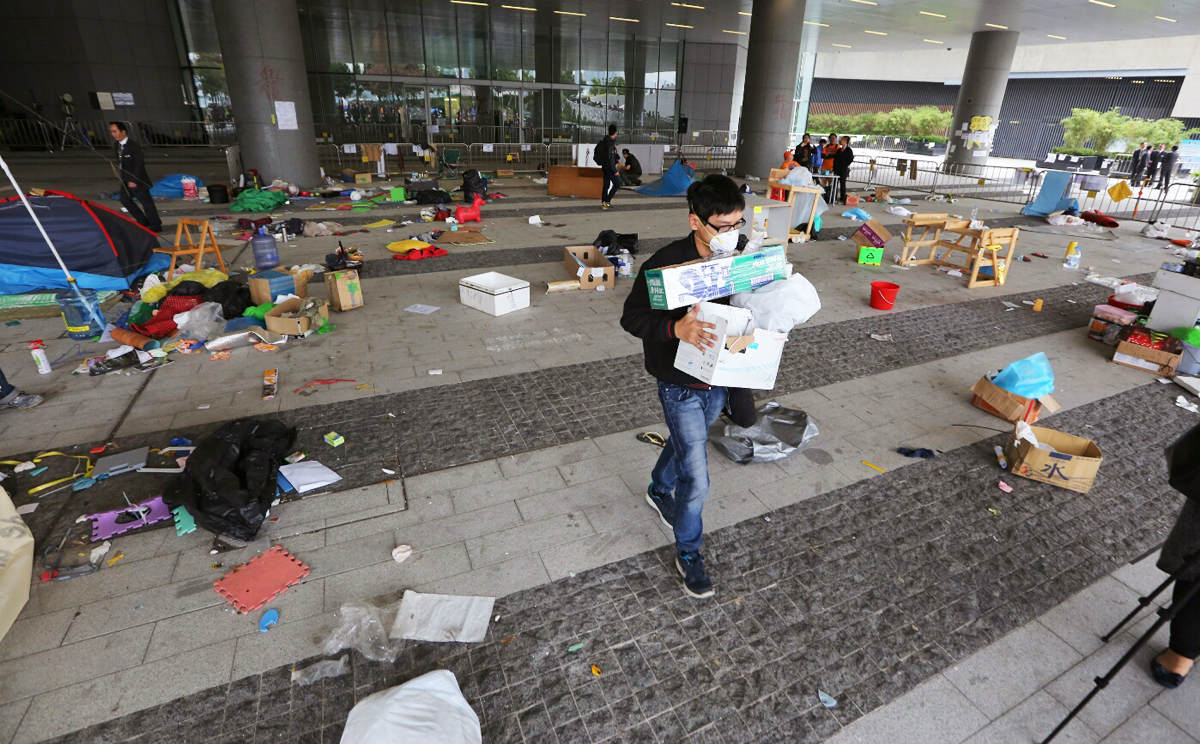
Protesters voluntarily packed up their belongings and transferred to a different area. Photo: Felix Wong
Tsang said they could seek help from the police if protesters “resist vigorously and threaten the safety of the staff members.”
“The protesters said they are willing to make way for emergency vehicles, but the Legco’s secretariat told them it was not acceptable", as lawmakers’ access to the building’s main entrance was still blocked, he said.
“The public protest zone is supposed to be open for the public to protest [in]. Now the protesters’ occupation is in fact depriving others of the right to use the area … It posed threat to public hygiene and safety, and there were even people having hot pot [for dinner using a gas stove despite our] staff’s request for them to stop,” Tsang said.
After the protest zone and the square outside Legco are cleared, the area will be closed for about three weeks for cleaning and repairs, before being reopened possibly on January 7 in time for the first meeting of the year, Tsang said.
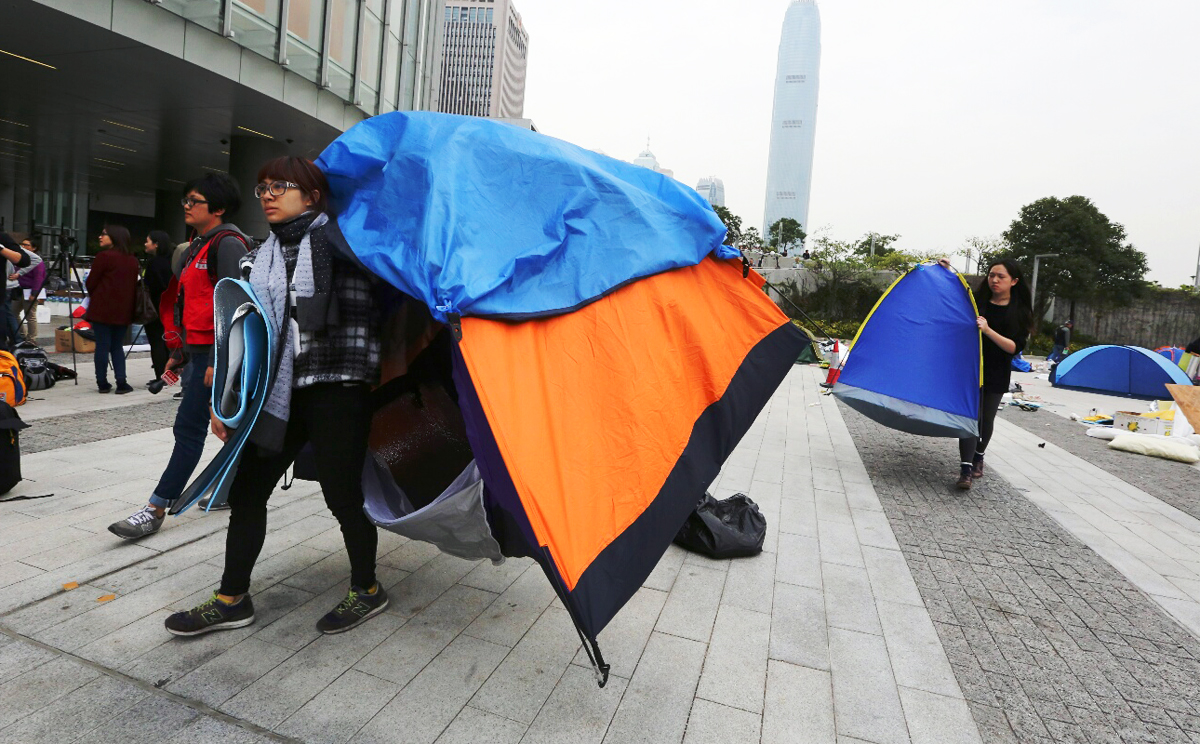
A protester hauls a tent away from Legco. Photo: Felix Wong
Earlier, police officers in Causeway Bay formed a cordon at around 10.30am and started clearing obstacles at the Occupy camp on the pedestrian crossing outside Sogo department store, using bolt cutters and their bare hands to remove the thin line of metal barricades.
They collapsed tents and took down banners, with some officers scrambling on top of tram station roofs to do so. They also took away wooden pallets used as makeshift furniture or speakers' platforms during the protests.
At half past noon, officers arrested three people, including a man in his 90s known as "Grandpa Wong", who remained on Yee Wo Street. The other two were middle-aged.
Grandpa Wong, a well-known participant of the protests, had previously been arrested during the Admiralty camp's clearance last Thursday and on Chater Road on July 2. He refused offers of a wheelchair, preferring to walk with a cane as he was hauled away.
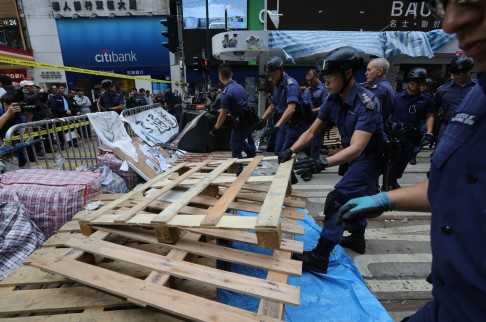
Police dismantled the Causeway Bay protest site ahead of a planned clearance in Legco. Photo: sam Tsang
Police also took away 17 protesters who held an impromptu sit-in in the middle of the road, including lawmaker Chan Ka-Lok, who had also been arrested in the Admiralty operation.
Five of the sit-in protesters, including Ian Chan, a Federation of Students member, were in Causeway Bay since the start of Occupy Central on September 28. Seven Occupy supporters who used to be based in Mong Kok, plus five others, were led away with the rest to a police vehicle.
By 1pm, the cleaning crews' trucks, which carried water to hose down the streets, were seen driving away. Faint chalk marks saying "I want true universal suffrage" were still visible on the pavement.
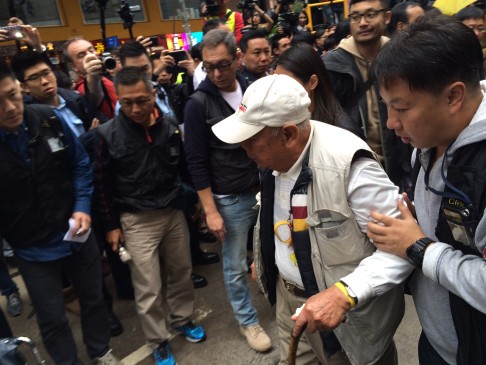
Grandpa Wong, a well-known participant of the protests, who had been arrested in two other clearance operations is taken away by police. Photo: Samuel Chan
A few onlookers in front of Sogo chanted the same words scrawled on the gravel, and as the bus carrying the arrestees drove past, they made a three-finger salute echoing a protest sign in the movie The Hunger Games.
Highlighting the relatively relaxed pace of the operation, officers took a group photo at the end.
Normal traffic resumed after more than 70 days, with a policeman on a motorbike leading the first batch of cars through the eastbound lanes of Yee Wo Street.
The protest enclave had stretched from Hennessy Road, in the middle of a bustling shopping area, down to Yee Wo.
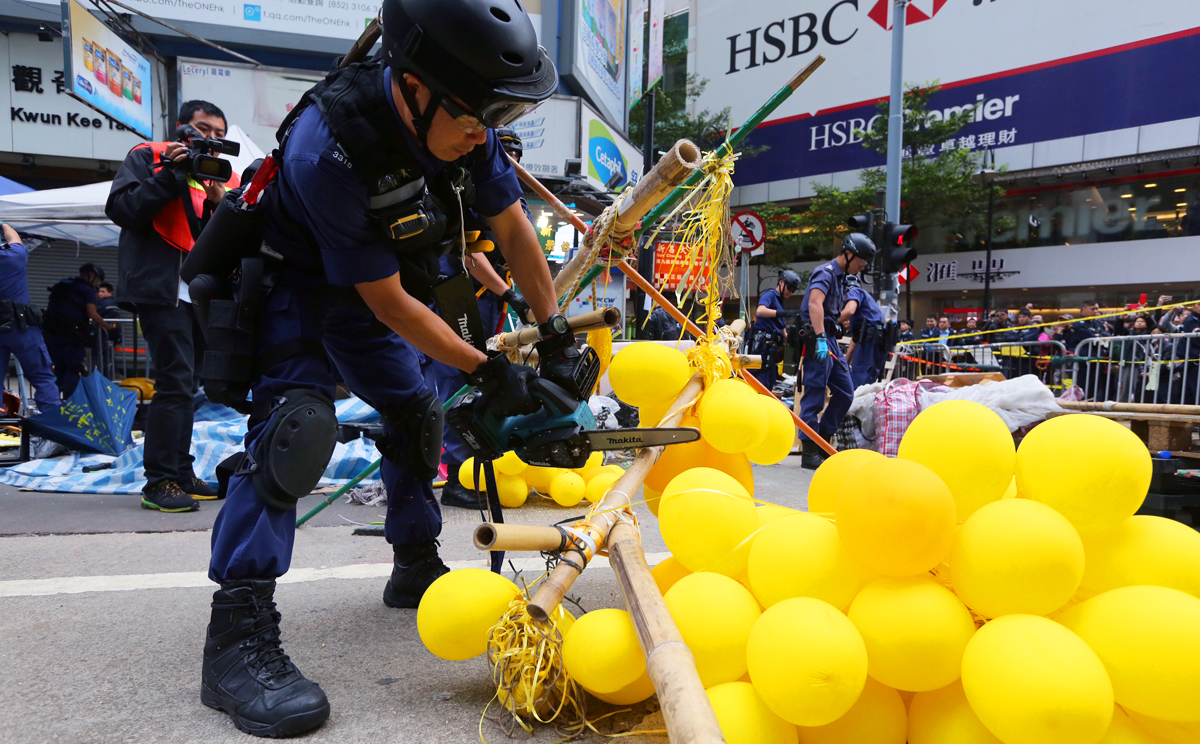
An officer uses a mini-chainsaw to cut wooden structures. Photo: Sam Tsang
Earlier, as uncertainty hung in the air over imminent arrests and watching the camp quickly disappear, a sit-in protester clad in a yellow jacket broke into tears.
"Has this government ever listened to us?" the protester said, crying, after police issued another warning for them to leave.
Lawmaker Chan Ka-Lok, holding a yellow umbrella, told police to give up persuading the group to exit. "We will not leave! We want true democracy!"
Police spokesman Kong Man-keung had given protesters 30 minutes to leave the area before the clearance began. He warned that anyone who resisted, provoked the police or used violence would be met with "minimal, proportional force" and may be arrested.
Police set up two access control points in and out of the buildings and shops on Yee Wo Street, as well as a traffic control area stretching from Percival Street to Jardine's Bazaar and Sugar Street.
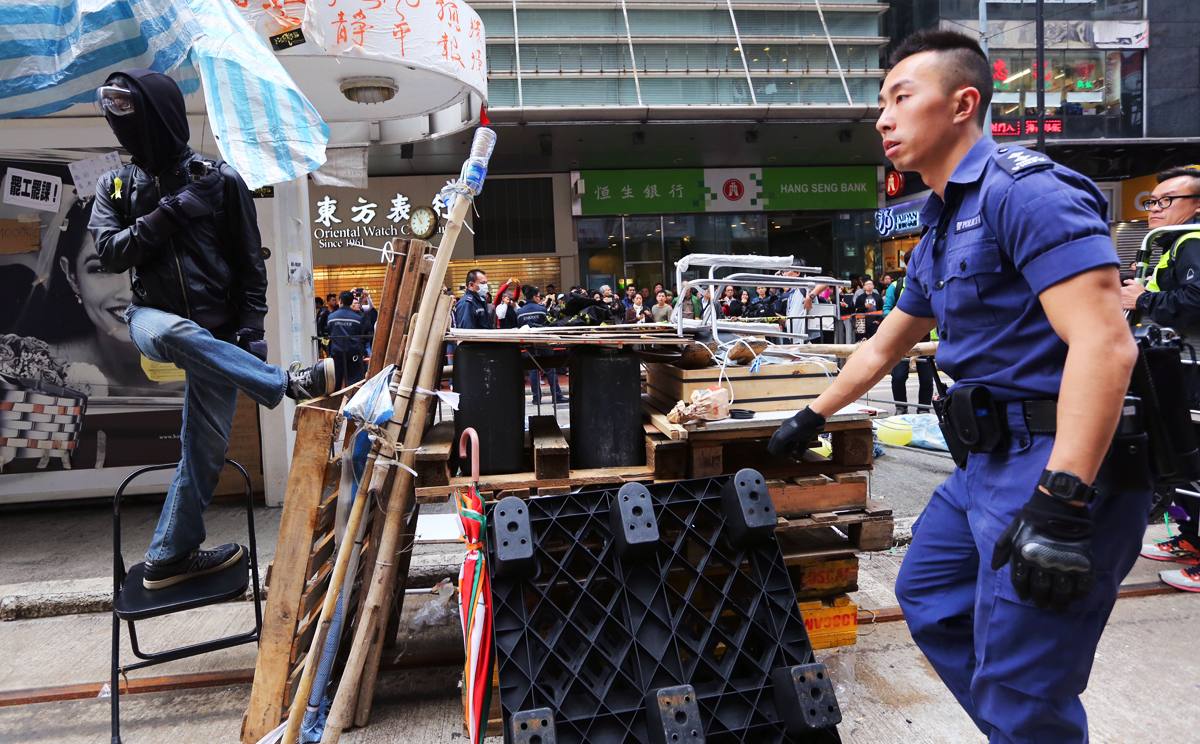
Police have started clearing the camp in front of the Sogo shopping mall. Photo: Sam Tsang
Anyone who left during the operation would have to register their Hong Kong IDs. Kong said those registered might face legal liabilities in the future.
At least one person had to register that morning: a masked man clad in a black jacket who was frisked by police at around 11.30am after being spotted moving around the camp and standing on a chair.
When police asked what he was doing, he pointed to a GoPro camera mounted on the strap of his rucksack. He had a yellow ribbon - a symbol of the democracy movement - pinned on the other side of his jacket.
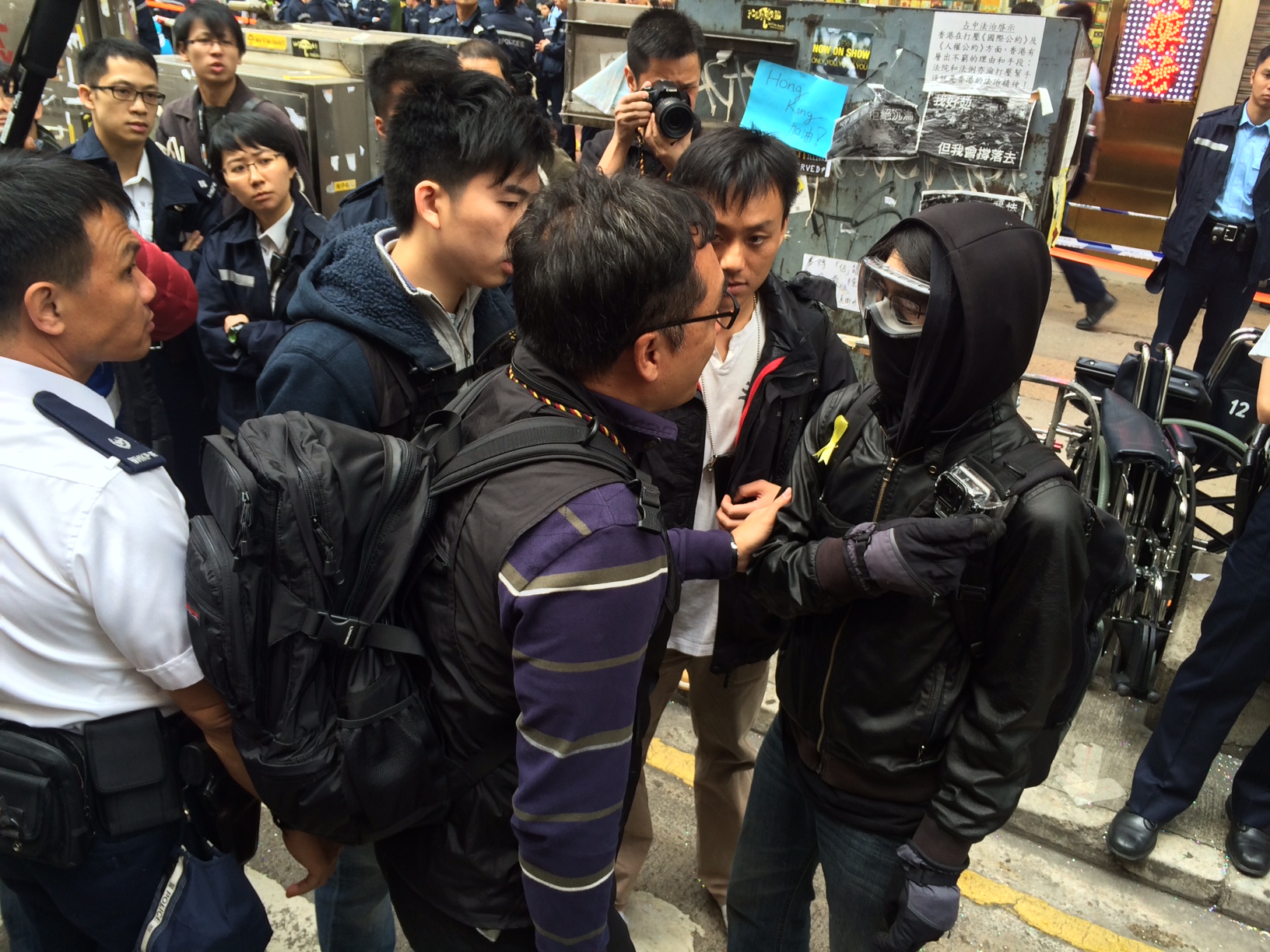
The masked man, when approached by police, pointed to his GoPro camera in explanation. Photo: Samuel Chan
He refused to give his name, but said he came to Causeway Bay to document the police operation, which he described as very restrained. He said the officers asked him to show his Hong Kong ID card, and they took note of his details, but they did not say if they would charge him.
Civilians moving within the clearance site, with or without a camera, needed a press badge or else would be considered one of the protesters.
Unlike the clearance of camps in Mong Kok and Admiralty - the former marked by clashes between police and Occupy supporters and the latter slowed down by a sit-in held by a hundred people - the operation in Causeway Bay had been expected to be swift.
Ten minutes after a briefing, police officers mounted yellow stepladders as a makeshift stage from which to tell the protesters to leave.
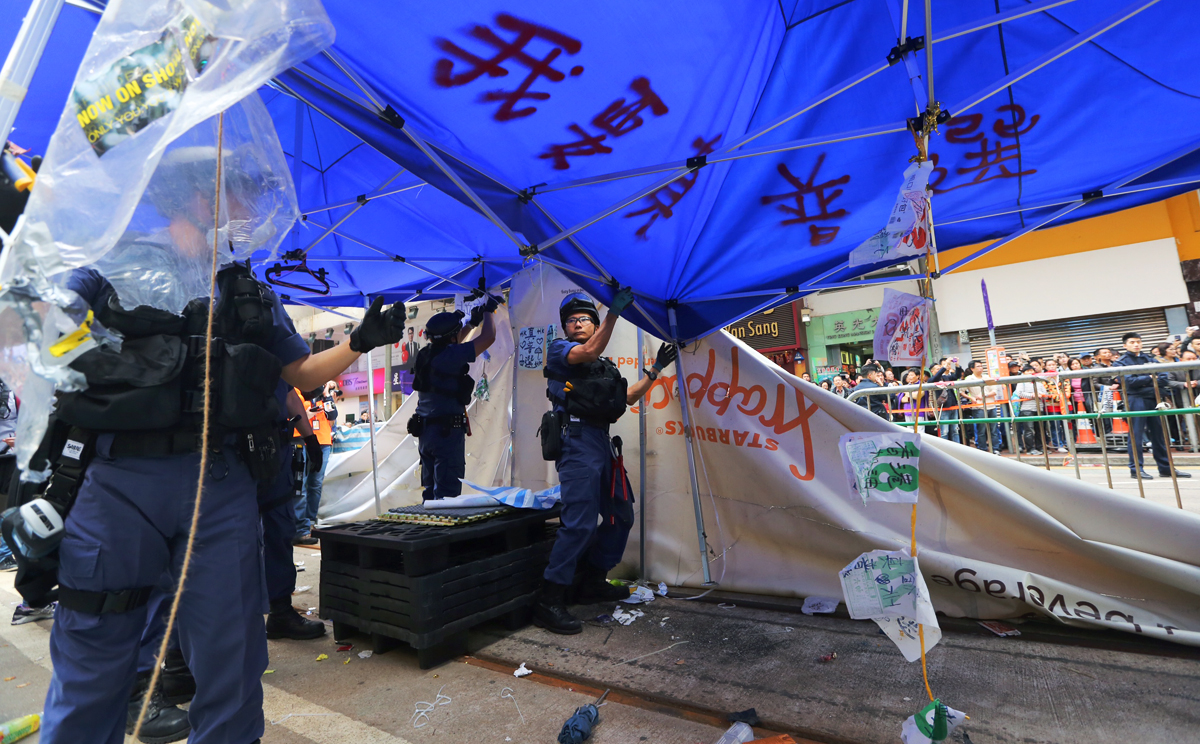
Police have started clearing the camp in front of the Sogo shopping mall. Photo: Sam Tsang
Later, at noon, police warned remaining sit-in participants to leave.
"You are still allowed to leave the cordoned-off area at the Patterson Street exit after your personal information is recorded. You still have a choice," a police negotiator told the group, who said they would stay.
A smattering of protesters' tents outside the Legislative Council complex are expected to be cleared in the afternoon as well.
Independent Police Complaints Council members Eric Cheung Tat-Ming and Lau Man-man arrived this morning to monitor the proceedings.
Two other members of the police watchdog are also at the scene, Cheung said.
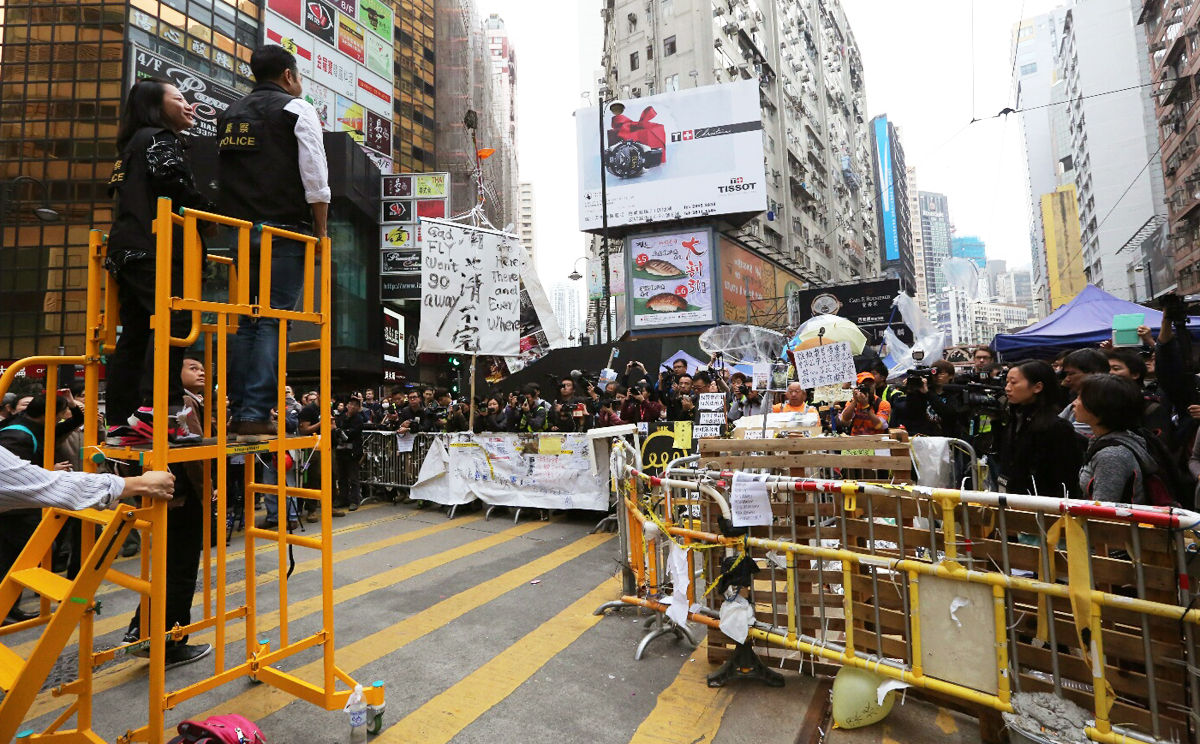
Police announce protesters have 30 minutes to pack up and go. Photo: Felix Wong
About a dozen die-hard Occupy protesters posed for a group photo before the clearance was due to start. They also chanted slogans which say they would continue the movement at the community level.
Protesters had already packed up many tents and supplies, saving some of the street art, but a few tents still stood this morning.
A woman had come early this morning and flashed protesters with a placard saying: “Thank you for your contribution."
However, Kelvin Yeung, 50, who works in a bank nearby, said he was glad to see the protesters go.
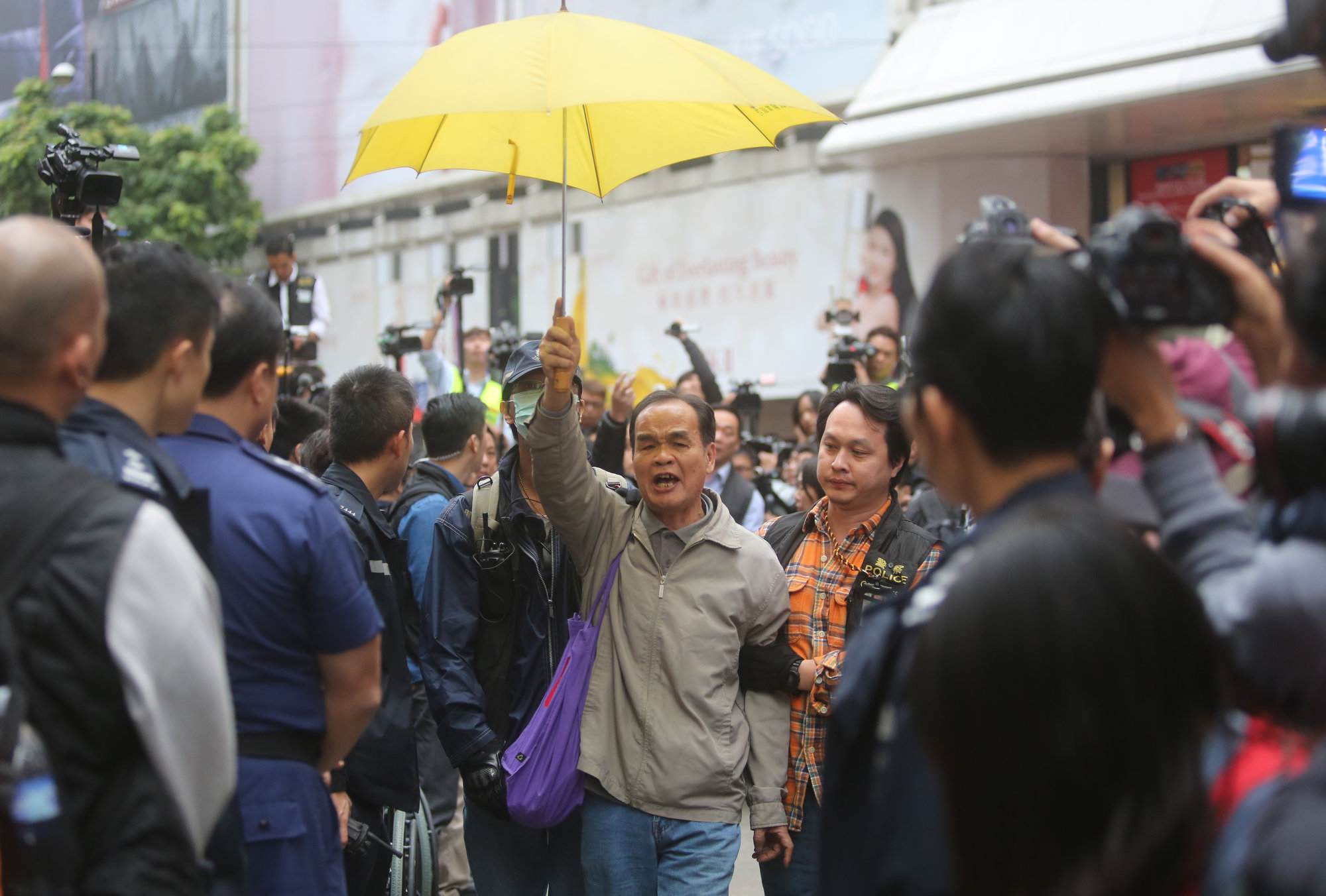
A man holds up a yellow umbrella as he is led away by police in Causeway Bay. Photo: Sam Tsang
"I agree with the need for true universal suffrage, but dragging all Hong Kongers into the protest by blocking the streets isn't the way to do it," he said. "Blocking the streets for eight or 10 days is fine, but two months is too much."
Tang Wai, in his 60s, who lives a few streets away, came down to watch the police operation. He said though it had inconvenienced commuters - including his grandson, who had to take a taxi to school each day - he agreed with the cause.
"They're fighting for the greater good, not for private gain. The government should have kept negotiating with them long ago so they didn't have to occupy this area for two months."
Tang said his friends in the neighbourhood, however, thought the protests were a nuisance. "Some of them said they had to keep their windows closed every night because of the protesters singing," Tang said.
He said some business owners he knew on Yee Wo Street had seen less foot traffic, but that they tolerated the protesters.
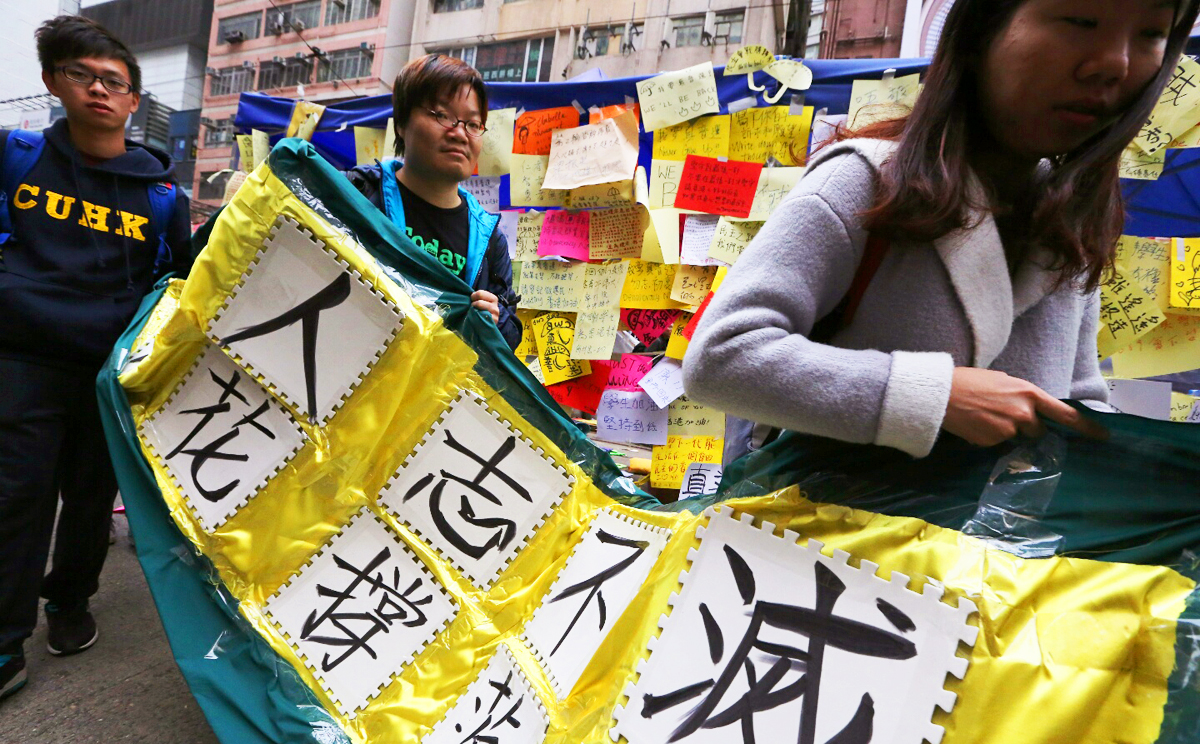
Protesters had already packed up many tents and supplies, saving some of the street art, but a few tents still stood this morning. Photo: Felix Wong
Barry Ho, managing director of a dispensary on Yee Wo Street who has seen revenues drop by 30 per cent, was relieved by today's clearance. "You know how tourists wheel their suitcases around. For the past two months, all their coaches stopped in Central and Sheung Wan and just avoided this area."
"I've never seen anything take such a toll on business," he said, adding it made the Sars outbreak in 2003 rosy by comparison. "At least we could sell disinfectants during the Sars outbreak."
"Gaining universal suffrage takes time. I'd rather they try to achieve their goal through legal and peaceful means," Ho said.
Student leaders have recently launched a "non-cooperation movement" as an offshoot to the protests, calling on Hongkongers to pay their taxes in small increments and to delay paying rent until the last possible minute, to show displeasure against the government.
With additional reporting from Agence France-Presse
‘Occupy is over’: Hong Kong chief executive announces end to protests as Causeway Bay is cleared
PUBLISHED : Monday, 15 December, 2014, 9:41am
UPDATED : Monday, 15 December, 2014, 7:08pm
Samuel Chan, Alan Yu, Tony Cheung and Ng Kang-chung

Police have started clearing the camp in front of the Sogo shopping mall. Photo: Sam Tsang
Hong Kong’s leader declared an end to 78 days of mass protests by pro-democracy demonstrators after police today cleared the last major camp and arrested 20 peaceful protesters.
“With the completion of the clearance work in the occupation site in Causeway Bay, the illegal occupation action that has lasted for more than two months in Hongkong is over," Chief Executive Leung Chun-ying said, adding that they had caused a “serious loss” to the local economy and damaged the rule of law.
“Now I think we should reflect on an important issue. That is, what is the kind of democracy that Hong Kong should pursue? I think it should be ‘democracy with the rule of law' that Hong Kong, as well as other advanced democracies, are pursuing,” said Leung, speaking to reporters after a ceremony of a local foundation.
“If we only talk about democracy, but not rule of law. It is not true democracy. It is only anarchy,” he added.
The last blow was when security guards cleared a small pro-democracy camp outside the Legislative Council that demonstrators had already retreated from.
A total of 955 people had been arrested as of today for offences relating to the Occupy protests.,police said on Monday night. Some 130 police officers were injured during the protests and 221 protesters received medical treatment through arrangements made by police.
Police received complaints from 1,972 members of the public, of which 106 have been classified as reportable complaints to be put under police watchdog's scrutiny. Most complaints involve neglect of duty and unnecessary use of authority.
Among the complainants, 137 are the aggrieved or directly-affected parties, while the rest police say are members of the public who made complaints after watching footage in the media or online. So far, 75 people have turned themselves in to the police.
By the 3pm clearance deadline, nearly all of the protesters' tents and belongings at the building's drop-off entrance for cars and the adjacent piazza had been packed up voluntarily. Just a flotsam of rubbish, boxes and plastic bags remained in front of the building.
About 10 protesters stayed briefly, but were keen to avoid possible arrest. A performance artist, Au Yeung Tung, who is also a member of the pro-democratic party ADLP, arrived and started shuffling in slow-motion to illustrate the "pace of democracy in Hong Kong over the years".
The last person to take a stand inside that specific area was 60-year-old retired teacher Fung Tak-wah, who refused to leave, and had to be picked up and carried out by security guards.
As workers quickly cleaned up the Legco site, a demonstrator started playing music, adopted by the Umbrella Movement, on a small speaker. The area was declared temporarily off-limits to all people except cleaners, who scraped posters stuck to the walls and swept up debris.
Others refused to give up the cause - the push for a free choice in the election - even if it meant protesting by their lonesome. Tai Kwai-heung, 61, pitched a tent on Tim Mei Avenue near the government headquarters, indignant that the demonstrators were shut out of Legco.
"I may not live for very long, but I'm worried for my children and grandchildren. That's why I'm here, and the same is true for other elderly protesters," Tai said.
Legislative Council President Jasper Tsang Yok-sing had announced the clearance after the majority of members in the Legco Commission, which oversees the legislature’s affairs, voted in favour of it during a four-hour meeting.

Protesters voluntarily packed up their belongings and transferred to a different area. Photo: Felix Wong
Tsang said they could seek help from the police if protesters “resist vigorously and threaten the safety of the staff members.”
“The protesters said they are willing to make way for emergency vehicles, but the Legco’s secretariat told them it was not acceptable", as lawmakers’ access to the building’s main entrance was still blocked, he said.
“The public protest zone is supposed to be open for the public to protest [in]. Now the protesters’ occupation is in fact depriving others of the right to use the area … It posed threat to public hygiene and safety, and there were even people having hot pot [for dinner using a gas stove despite our] staff’s request for them to stop,” Tsang said.
After the protest zone and the square outside Legco are cleared, the area will be closed for about three weeks for cleaning and repairs, before being reopened possibly on January 7 in time for the first meeting of the year, Tsang said.

A protester hauls a tent away from Legco. Photo: Felix Wong
Earlier, police officers in Causeway Bay formed a cordon at around 10.30am and started clearing obstacles at the Occupy camp on the pedestrian crossing outside Sogo department store, using bolt cutters and their bare hands to remove the thin line of metal barricades.
They collapsed tents and took down banners, with some officers scrambling on top of tram station roofs to do so. They also took away wooden pallets used as makeshift furniture or speakers' platforms during the protests.
At half past noon, officers arrested three people, including a man in his 90s known as "Grandpa Wong", who remained on Yee Wo Street. The other two were middle-aged.
Grandpa Wong, a well-known participant of the protests, had previously been arrested during the Admiralty camp's clearance last Thursday and on Chater Road on July 2. He refused offers of a wheelchair, preferring to walk with a cane as he was hauled away.

Police dismantled the Causeway Bay protest site ahead of a planned clearance in Legco. Photo: sam Tsang
Police also took away 17 protesters who held an impromptu sit-in in the middle of the road, including lawmaker Chan Ka-Lok, who had also been arrested in the Admiralty operation.
Five of the sit-in protesters, including Ian Chan, a Federation of Students member, were in Causeway Bay since the start of Occupy Central on September 28. Seven Occupy supporters who used to be based in Mong Kok, plus five others, were led away with the rest to a police vehicle.
By 1pm, the cleaning crews' trucks, which carried water to hose down the streets, were seen driving away. Faint chalk marks saying "I want true universal suffrage" were still visible on the pavement.

Grandpa Wong, a well-known participant of the protests, who had been arrested in two other clearance operations is taken away by police. Photo: Samuel Chan
A few onlookers in front of Sogo chanted the same words scrawled on the gravel, and as the bus carrying the arrestees drove past, they made a three-finger salute echoing a protest sign in the movie The Hunger Games.
Highlighting the relatively relaxed pace of the operation, officers took a group photo at the end.
Normal traffic resumed after more than 70 days, with a policeman on a motorbike leading the first batch of cars through the eastbound lanes of Yee Wo Street.
The protest enclave had stretched from Hennessy Road, in the middle of a bustling shopping area, down to Yee Wo.

An officer uses a mini-chainsaw to cut wooden structures. Photo: Sam Tsang
Earlier, as uncertainty hung in the air over imminent arrests and watching the camp quickly disappear, a sit-in protester clad in a yellow jacket broke into tears.
"Has this government ever listened to us?" the protester said, crying, after police issued another warning for them to leave.
Lawmaker Chan Ka-Lok, holding a yellow umbrella, told police to give up persuading the group to exit. "We will not leave! We want true democracy!"
Police spokesman Kong Man-keung had given protesters 30 minutes to leave the area before the clearance began. He warned that anyone who resisted, provoked the police or used violence would be met with "minimal, proportional force" and may be arrested.
Police set up two access control points in and out of the buildings and shops on Yee Wo Street, as well as a traffic control area stretching from Percival Street to Jardine's Bazaar and Sugar Street.

Police have started clearing the camp in front of the Sogo shopping mall. Photo: Sam Tsang
Anyone who left during the operation would have to register their Hong Kong IDs. Kong said those registered might face legal liabilities in the future.
At least one person had to register that morning: a masked man clad in a black jacket who was frisked by police at around 11.30am after being spotted moving around the camp and standing on a chair.
When police asked what he was doing, he pointed to a GoPro camera mounted on the strap of his rucksack. He had a yellow ribbon - a symbol of the democracy movement - pinned on the other side of his jacket.

The masked man, when approached by police, pointed to his GoPro camera in explanation. Photo: Samuel Chan
He refused to give his name, but said he came to Causeway Bay to document the police operation, which he described as very restrained. He said the officers asked him to show his Hong Kong ID card, and they took note of his details, but they did not say if they would charge him.
Civilians moving within the clearance site, with or without a camera, needed a press badge or else would be considered one of the protesters.
Unlike the clearance of camps in Mong Kok and Admiralty - the former marked by clashes between police and Occupy supporters and the latter slowed down by a sit-in held by a hundred people - the operation in Causeway Bay had been expected to be swift.
Ten minutes after a briefing, police officers mounted yellow stepladders as a makeshift stage from which to tell the protesters to leave.

Police have started clearing the camp in front of the Sogo shopping mall. Photo: Sam Tsang
Later, at noon, police warned remaining sit-in participants to leave.
"You are still allowed to leave the cordoned-off area at the Patterson Street exit after your personal information is recorded. You still have a choice," a police negotiator told the group, who said they would stay.
A smattering of protesters' tents outside the Legislative Council complex are expected to be cleared in the afternoon as well.
Independent Police Complaints Council members Eric Cheung Tat-Ming and Lau Man-man arrived this morning to monitor the proceedings.
Two other members of the police watchdog are also at the scene, Cheung said.

Police announce protesters have 30 minutes to pack up and go. Photo: Felix Wong
About a dozen die-hard Occupy protesters posed for a group photo before the clearance was due to start. They also chanted slogans which say they would continue the movement at the community level.
Protesters had already packed up many tents and supplies, saving some of the street art, but a few tents still stood this morning.
A woman had come early this morning and flashed protesters with a placard saying: “Thank you for your contribution."
However, Kelvin Yeung, 50, who works in a bank nearby, said he was glad to see the protesters go.

A man holds up a yellow umbrella as he is led away by police in Causeway Bay. Photo: Sam Tsang
"I agree with the need for true universal suffrage, but dragging all Hong Kongers into the protest by blocking the streets isn't the way to do it," he said. "Blocking the streets for eight or 10 days is fine, but two months is too much."
Tang Wai, in his 60s, who lives a few streets away, came down to watch the police operation. He said though it had inconvenienced commuters - including his grandson, who had to take a taxi to school each day - he agreed with the cause.
"They're fighting for the greater good, not for private gain. The government should have kept negotiating with them long ago so they didn't have to occupy this area for two months."
Tang said his friends in the neighbourhood, however, thought the protests were a nuisance. "Some of them said they had to keep their windows closed every night because of the protesters singing," Tang said.
He said some business owners he knew on Yee Wo Street had seen less foot traffic, but that they tolerated the protesters.

Protesters had already packed up many tents and supplies, saving some of the street art, but a few tents still stood this morning. Photo: Felix Wong
Barry Ho, managing director of a dispensary on Yee Wo Street who has seen revenues drop by 30 per cent, was relieved by today's clearance. "You know how tourists wheel their suitcases around. For the past two months, all their coaches stopped in Central and Sheung Wan and just avoided this area."
"I've never seen anything take such a toll on business," he said, adding it made the Sars outbreak in 2003 rosy by comparison. "At least we could sell disinfectants during the Sars outbreak."
"Gaining universal suffrage takes time. I'd rather they try to achieve their goal through legal and peaceful means," Ho said.
Student leaders have recently launched a "non-cooperation movement" as an offshoot to the protests, calling on Hongkongers to pay their taxes in small increments and to delay paying rent until the last possible minute, to show displeasure against the government.
With additional reporting from Agence France-Presse
Re: HK HK Leow!!
Hong Kong police target Occupy Central instigators after all sites cleared
Commissioner Andy Tsang says he hopes probe can be completed within three months
PUBLISHED : Tuesday, 16 December, 2014, 1:11am
UPDATED : Tuesday, 16 December, 2014, 1:24am
Samuel Chan, Alan Yu and Joyce Ng
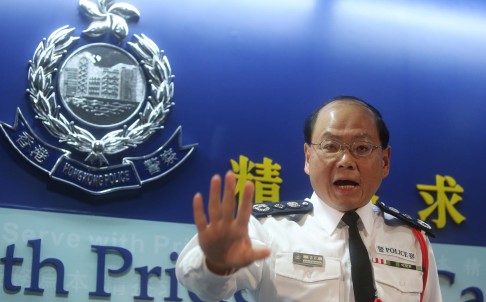
Andy Tsang (above) makes a point as the final protest sites are cleared. Photo: Sam Tsang
Hours after the last Occupy site in Causeway Bay was cleared yesterday, Police Commissioner Andy Tsang Wai-hung announced that the force would arrest the "principal instigators" and aim to finish its investigations within three months.
Police revealed that close to 1,000 people had been arrested since Occupy began, while over 900 had had their identity card numbers recorded as of yesterday. This came as Chief Executive Leung Chun-ying declared the end of the protests.
Leung said that seeking democracy at the expense of rule of law was not real democracy, adding: "With the completion of the clearance in Causeway Bay, the occupation that has lasted for more than two months in Hong Kong is over."
Chairing his first media briefing since Occupy began, Tsang, alongside four other top-level officers, said the police would devote extra resources for investigations involving the "principal instigators" of Occupy Central.
"Our target is to complete all investigation within three months," Tsang said.
During Occupy, some 221 protesters required medical treatment and were assisted by police, while 130 police officers sustained injuries, none of them serious. A total of 75 individuals had surrendered to police as of yesterday.
Tsang also said deployment would be stepped up over the Christmas and New Year holiday period to prevent any reoccupy attempts or illegal protests.
It is also understood that the force would maintain Solar Peak, the name given to its operation set up to handle the Occupy protests, during the holidays, with 7,000 officers divided into two 12-hour shifts, deployed or on stand-by at locations where Occupy happened.
Tsang also dismissed suggestions there were political considerations behind the all-out clearance, which took place before President Xi Jinping visits Macau later this week.
While the force's Complaints Against Police Office has so far received Occupy-related complaints from 1,972 individuals, Tsang said the police "had remained steadfast, devoted and forbearing at this critical time".
"Police have all along been the most tolerant and restrained in the hope of avoiding any major clashes or bloodshed," Tsang said. "The relatively peaceful end to the illegal Occupy movement that we see today is a result of the appropriate measures we took."
In Causeway Bay yesterday, 17 protesters - including a man in his 90s who was arrested twice after joining sit-ins and a Beijing native who joined the 1989 pro-democracy student movement in Tiananmen Square - were arrested after the site was cleared in about an hour.
Feelings appeared to be mixed after the site was cleared.
Yee Wo Street resident Arjun Bharadwaj, 25, said he was sad to see the protesters cleared. "This is the first time I have seen protests this peaceful," he said.
But a dispensary owner was relieved. "I've never seen anything take such a toll on business. At least we could sell disinfectant during the Sars outbreak [of 2003]," he said, pointing to a 30 per cent drop in business since Occupy began.
Most of the dozens of protesters who remained on the grounds of the Legislative Council yesterday also packed and left on their own without any police intervention. However, security guards had to carry out one man.
Hong Kong police target Occupy Central instigators after all sites cleared
Commissioner Andy Tsang says he hopes probe can be completed within three months
PUBLISHED : Tuesday, 16 December, 2014, 1:11am
UPDATED : Tuesday, 16 December, 2014, 1:24am
Samuel Chan, Alan Yu and Joyce Ng

Andy Tsang (above) makes a point as the final protest sites are cleared. Photo: Sam Tsang
Hours after the last Occupy site in Causeway Bay was cleared yesterday, Police Commissioner Andy Tsang Wai-hung announced that the force would arrest the "principal instigators" and aim to finish its investigations within three months.
Police revealed that close to 1,000 people had been arrested since Occupy began, while over 900 had had their identity card numbers recorded as of yesterday. This came as Chief Executive Leung Chun-ying declared the end of the protests.
Leung said that seeking democracy at the expense of rule of law was not real democracy, adding: "With the completion of the clearance in Causeway Bay, the occupation that has lasted for more than two months in Hong Kong is over."
Chairing his first media briefing since Occupy began, Tsang, alongside four other top-level officers, said the police would devote extra resources for investigations involving the "principal instigators" of Occupy Central.
"Our target is to complete all investigation within three months," Tsang said.
During Occupy, some 221 protesters required medical treatment and were assisted by police, while 130 police officers sustained injuries, none of them serious. A total of 75 individuals had surrendered to police as of yesterday.
Tsang also said deployment would be stepped up over the Christmas and New Year holiday period to prevent any reoccupy attempts or illegal protests.
It is also understood that the force would maintain Solar Peak, the name given to its operation set up to handle the Occupy protests, during the holidays, with 7,000 officers divided into two 12-hour shifts, deployed or on stand-by at locations where Occupy happened.
Tsang also dismissed suggestions there were political considerations behind the all-out clearance, which took place before President Xi Jinping visits Macau later this week.
While the force's Complaints Against Police Office has so far received Occupy-related complaints from 1,972 individuals, Tsang said the police "had remained steadfast, devoted and forbearing at this critical time".
"Police have all along been the most tolerant and restrained in the hope of avoiding any major clashes or bloodshed," Tsang said. "The relatively peaceful end to the illegal Occupy movement that we see today is a result of the appropriate measures we took."
In Causeway Bay yesterday, 17 protesters - including a man in his 90s who was arrested twice after joining sit-ins and a Beijing native who joined the 1989 pro-democracy student movement in Tiananmen Square - were arrested after the site was cleared in about an hour.
Feelings appeared to be mixed after the site was cleared.
Yee Wo Street resident Arjun Bharadwaj, 25, said he was sad to see the protesters cleared. "This is the first time I have seen protests this peaceful," he said.
But a dispensary owner was relieved. "I've never seen anything take such a toll on business. At least we could sell disinfectant during the Sars outbreak [of 2003]," he said, pointing to a 30 per cent drop in business since Occupy began.
Most of the dozens of protesters who remained on the grounds of the Legislative Council yesterday also packed and left on their own without any police intervention. However, security guards had to carry out one man.
Similar threads
- Replies
- 2
- Views
- 307
- Replies
- 8
- Views
- 485
- Replies
- 1
- Views
- 677

